The post GCB vs Ultra High Luxury Apartment : Property Tax hiked will it affect the luxury market appeared first on Wing Tai Holdings Singapore.
]]>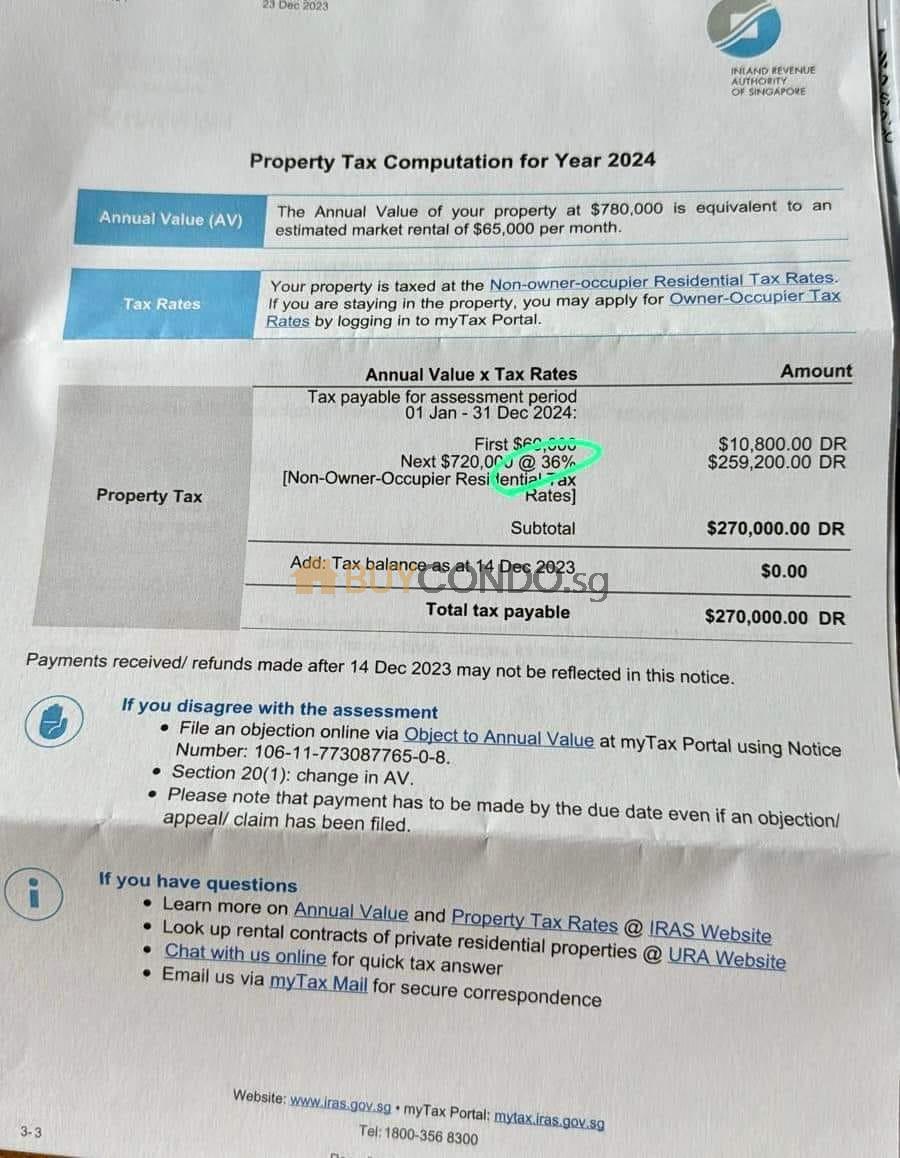
There are heavy discussions online that one of the luxury home owners shared that she is required to pay a whopping S$270,000 in Taxes so much more than the years before.
This is still not including the Income Tax payable for the Rental income (Highest tier of 24% for Ultra High Income earners)
Lets dive into the Case Study.
(Non-Owner Occupier Tax. First $60,000 is 18%; in excess of the $60,000, the next $720,000 is taxable at the rate of 36%)
Assume the GCB is renting out at $65,000 per month.
Annually the Rental Income shall be $780,000 per annum.
( Net Income before property maintenance and bank loan with interest if any)
$780,000(Annual Rent) – $270,000 (Property Tax) – $187,200 ( Income Tax) = Net Rental Income $322,800.
( Holding Cost of such Ultra Luxury Landed Property)
$270,000 + $187,200 = Holding Cost $457,200.
Some Points Gathered:
Holding Cost for a rented out property is higher than the total rental income.
What are this kind of Properties that falls into this Bracket?
Good Class Bungalows(GCB) with an average of 15,000sqft land with the built up 8,000 ~ 12,000sqft
Such GCB can be in the market valued around $30,000,000 to $60,000,000.
Ultra Luxury Apartments in CCR.
Le Nouvel Ardmore ~ $80,000 per month, 4 bedroom 4058sqft.
Four Seasons Park Penthouse $78,000 per month, 9 Bedroom 6150sft.
Nassim Park Residences Penthouse $65,000 per month, 4 Bedroom 6800sft.
If you have a Desire to Own Such Property Would You Buy a GCB or Ultra High Luxury Apartment? Lets Compare
Annualized Capital Appreciation for Ultra High Luxury Apartments
Le Nouvel Ardmore ~ Rental $80,000 per month, 4 bedroom 4058sqft.
(Owner Bought $18,500,000 ($4559psf/4058sqft) in 2021, Based on the latest Transaction of $5,800psf today’s Market Value is worth $23,536,400.
$23,536,400 – $18,500,000 = Approx $5,000,000 in 3 Years.
Annualized Capital Appreciation for Le Nouvel Ardmore: Approx $1,600,000, 8.6% per annum.
If we factor in the holding cost of say estimate of $600,000. There is still a net $1m per year before mortgage interest.
Annualized Capital Appreciation for Good Class Bungalow
80 Belmont Road. $55.5m – $34.5m = $21m Gains in 3 years.
Annualized Capital Appreciation for Le Nouvel Ardmore: Approx $7,000,000, 20% per annum.
From these comparison of Facts it will be quite clear where is better to place your money.
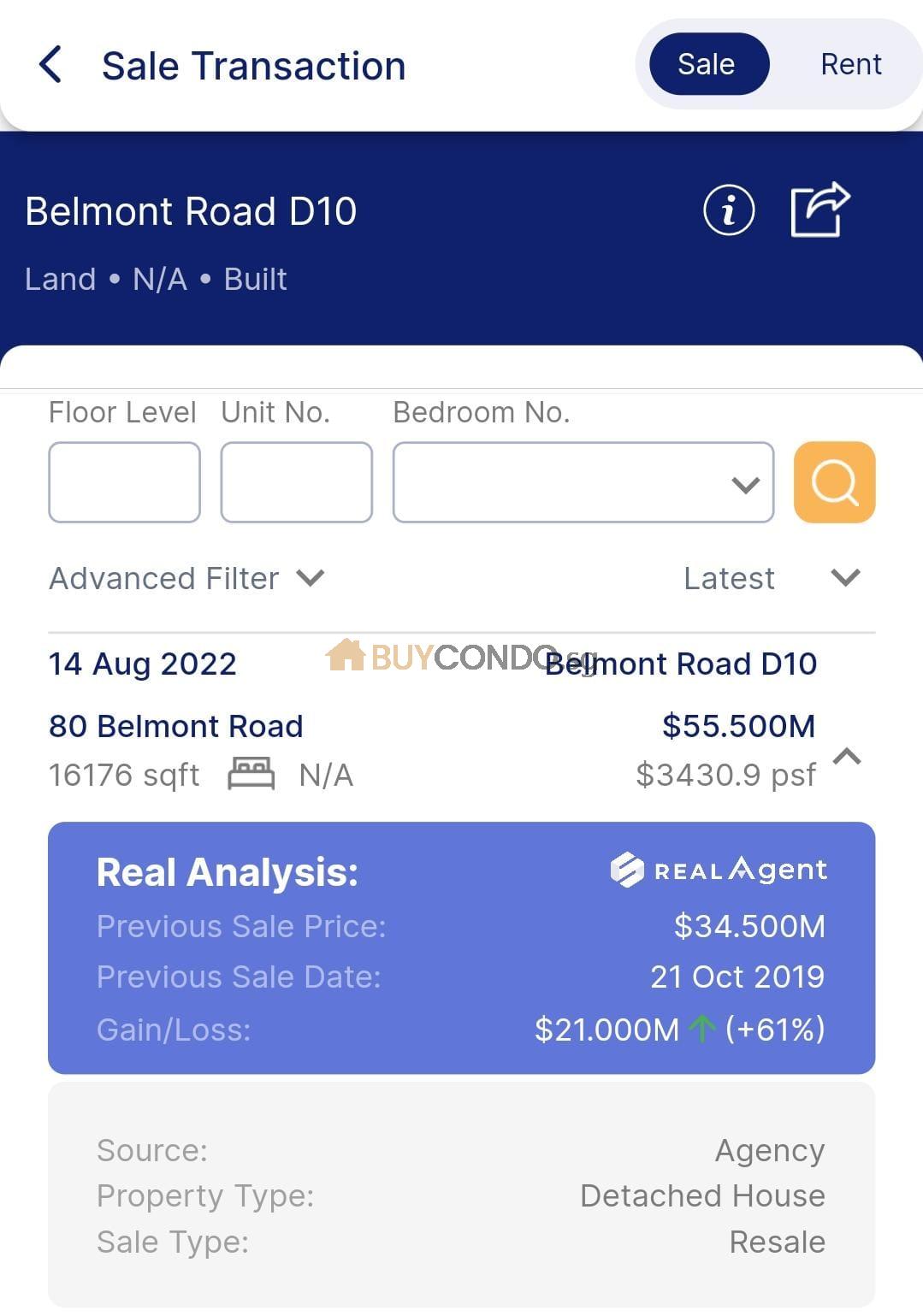
https://buycondo.sg/property-management-services/
Non-owner-occupier residential tax rates (residential properties) in 2024
Non-owner occupied residential properties are condominiums, HDB flats or other residential properties that the owner does not live in (“occupy”). Hence, owner-occupier tax rates do not apply.
The following tax rates apply to non-owner occupied properties except for those in the exclusion list.
Excluded properties
- Accommodation facilities within any sports and recreational club
- Chalet
- Child care centre, student care centre, or kindergarten
- Welfare home
- Hospital, hospice, or place for rehabilitation, convalescence, nursing care or similar purposes
- Hotel, backpackers’ hostel, boarding house or guest house
- Serviced apartment
- Staff quarters that are part of any property exempted from tax under S6(6) of the Property Tax Act
- Student’s boarding house or hostel
- Workers’ dormitory
The property must have received planning approval for the above use. No application to IRAS is required.
Non-owner-occupier residential tax rates
| Annual Value ($) | Effective 1 Jan 2024 | Property Tax Payable |
|---|---|---|
| First 30,000 Next $15,000 |
12% 20% |
$3,600 $3,000 |
| First $45,000 Next $15,000 |
– 28% |
$6,600 $4,200 |
| First $60,000 Above $60,000 |
– 36% |
$10,800 |
| Annual Value ($) | Tax rate effective from 1 Jan 2023 to 31 Dec 2023 | Property tax payable |
|---|---|---|
| First $30,000
Next $15,000 |
11%
16% |
$3,300
$2,400 |
| First $45,000
Next $15,000 |
–
21% |
$5,700
$3,150 |
| First $60,000
Above $60,000 |
–
27% |
$8,850
|
Owner-occupier tax rates (residential properties) in 2024
Owner-occupied residential properties are condominiums, HDB flats or other residential properties where the owner lives in (“occupies”) the property. Owner-occupied residential properties enjoy owner-occupier tax rates.
Owner-occupier tax rates
| Annual Value ($) | Effective 1 Jan 2024 | Property Tax Payable |
|---|---|---|
| First $8,000 Next $22,000 |
0% 4% |
$0 $880 |
| First $30,000 Next $10,000 |
– 6% |
$880 $600 |
| First $40,000 Next $15,000 |
– 10% |
$1,480 $1,500 |
| First $55,000 Next $15,000 |
– 14% |
$2,980 $2,100 |
| First $70,000 Next $15,000 |
– 20% |
$5,080 $3,000 |
| First $85,000 Next $15,000 |
– 26% |
$8,080 $3,900 |
| First $100,000 Above $100,000 |
– 32% |
$11,980
|
| Annual Value ($) | Tax rate effective from 1 Jan 2023 to 31 Dec 2023 | Property tax payable |
|---|---|---|
| First $8,000
Next $22,000 |
0%
4% |
$0
$880 |
| First $30,000
Next $10,000 |
–
5% |
$880
$500 |
| First $40,000
Next $15,000 |
–
7% |
$1,380
$1,050 |
| First $55,000
Next $15,000 |
–
10% |
$2,430
$1,500 |
| First $70,000
Next $15,000 |
–
14% |
$3,930
$2,100 |
| First $85,000
Next $15,000 |
–
18% |
$6,030
$2,700 |
| First $100,000
Above $100,000 |
–
23% |
$8,730
|

IRAS Income Tax rates (residential properties) in 2024
| Chargeable Income | Income Tax Rate (%) | Gross Tax Payable ($) |
|---|---|---|
| First $20,000 Next $10,000 |
0 2 |
0 200 |
| First $30,000 Next $10,000 |
– 3.50 |
200 350 |
| First $40,000 Next $40,000 |
– 7 |
550 2,800 |
| First $80,000 Next $40,000 |
– 11.5 |
3,350 4,600 |
| First $120,000 Next $40,000 |
– 15 |
7,950 6,000 |
| First $160,000 Next $40,000 |
– 18 |
13,950 7,200 |
| First $200,000 Next $40,000 |
– 19 |
21,150 7,600 |
| First $240,000 Next $40,000 |
– 19.5 |
28,750 7,800 |
| First $280,000 Next $40,000 |
– 20 |
36,550 8,000 |
| First $320,000 Next $180,000 |
– 22 |
44,550 39,600 |
| First $500,000 Next $500,000 |
– 23 |
84,150 115,000 |
| First $1,000,000 In excess of $1,000,000 |
– 24 |
199,150 |
From YA 2017 to YA 2023
| Chargeable Income | Income Tax Rate (%) | Gross Tax Payable ($) |
|---|---|---|
| First $20,000 Next $10,000 |
0 2 |
0 200 |
| First $30,000 Next $10,000 |
– 3.50 |
200 350 |
| First $40,000 Next $40,000 |
– 7 |
550 2,800 |
| First $80,000 Next $40,000 |
– 11.5 |
3,350 4,600 |
| First $120,000 Next $40,000 |
– 15 |
7,950 6,000 |
| First $160,000 Next $40,000 |
– 18 |
13,950 7,200 |
| First $200,000 Next $40,000 |
– 19 |
21,150 7,600 |
| First $240,000 Next $40,000 |
– 19.5 |
28,750 7,800 |
| First $280,000 Next $40,000 |
– 20 |
36,550 8,000 |
| First $320,000 In excess of $320,000 |
– 22 |
44,550 |

The Property Value Paradox: Rising Tax Versus Housing Market Gains
The increase in property tax raises the question of the property value paradox. While homeowners may experience higher tax obligations, they may also witness gains in the housing market. Understanding the relationship between rising property taxes and housing market gains is essential to evaluate the overall impact on homeowners’ finances.
As property taxes rise, homeowners might worry about the financial burden it presents. However, it’s important to consider the potential gains in the housing market. The property tax paradox emerges when higher taxes coincide with a robust housing market. While the tax burden increases, homeowners still benefit from appreciation in property value, creating a delicate balance.
Property values are influenced by various factors, including location, demand, and market trends. While property taxes are based on property values, the housing market can drive significant gains in property value over time. This creates a paradoxical situation where higher taxes are accompanied by increasing property values, raising questions about the overall financial impact on homeowners.
When property values increase, homeowners may consider the potential gains in equity and future resale value. These gains can offset the higher tax obligations, providing a positive aspect to the property value paradox. However, it’s crucial to assess the specific circumstances of each homeowner and evaluate the net impact of rising taxes and housing market gains.
The interplay between property taxes and market value highlights the complexity of homeowners’ financial considerations. While higher taxes can place a burden on homeowners, they should also consider the potential gains in property value, leading to increased wealth and financial stability.
Understanding the property value paradox and its implications is crucial for homeowners navigating the current landscape. By analyzing market trends, consulting with real estate professionals, and staying informed about property tax regulations, homeowners can make informed decisions about their investments and financial future.
| Housing Market Gains | Property Tax Paradox |
|---|---|
| Positive | Increase in tax obligations |
| Potential for equity gains | Potential for increased property value |
| Future resale value | Complex financial considerations |
Predicting Rental Income Tax Implications for Landlords
As a result of the property tax increase, landlords may encounter potential implications on their rental income taxes. It is crucial for landlords to navigate these changes and implement strategies to maintain profitability despite the increased tax burden.
Maintaining Profitability with Increased Property Taxes
With the rise in property taxes, landlords need to evaluate their financial position and explore ways to sustain profitability. This requires careful budgeting and analysis of rental income and expenses. Landlords should consider the impact of the increased property taxes on their rental yield and assess the feasibility of adjusting rental pricing to offset the higher tax obligations.
Cost-Passing Strategies: Rental Pricing Adjustments
One possible approach to manage the increased property taxes is to make rental pricing adjustments. Landlords may need to pass on a portion of the tax burden to tenants through reasonable rental price increases. However, it is essential to strike a balance between maintaining profitability and tenant affordability. Landlords should carefully analyze the rental market, competition, and demand before implementing any pricing adjustments.
Projected Effects on Rental Yield and Market Competition
The property tax increase can impact the rental yield, which measures the return on investment for landlords. Higher taxes may lower the overall rental yield, making it challenging for landlords to maintain expected returns. Additionally, market competition could intensify as landlords make pricing adjustments to address the increased tax burden. Consequently, landlords must monitor market dynamics closely and adapt to changing trends to remain competitive.
In summary, predicting the rental income tax implications for landlords in light of the property tax increase is crucial for their financial planning and decision-making. By maintaining profitability, implementing cost-passing strategies, and assessing the effects on rental yield and market competition, landlords can navigate these tax changes effectively and make informed choices for their rental properties. Let your Property Manager Handle for your properties today.
Is It Still Profitable to Rent Out or Sell in 2024?
With the significant increase in property taxes, homeowners must assess whether renting out or selling their property remains a profitable venture. The higher tax obligations may impact the potential returns for landlords, leading to a reconsideration of renting out properties. Similarly, homeowners may question whether selling their property is a more financially viable option in light of the property tax implications.

Profitability Comparison: Renting Out vs. Selling
In order to determine whether it is still profitable to rent out or sell in 2024, homeowners need to evaluate the financial implications of both options. Here is a breakdown of the key factors to consider:
| Renting Out | Selling | |
|---|---|---|
| Potential Rental Income | Homeowners can generate a steady stream of income through rental payments from tenants. | Selling the property can result in a lump sum cash infusion. |
| Property Tax Obligations | Rental income is subject to property tax, and the recent tax increase may impact profitability. | Selling the property may trigger capital gains tax, which needs to be factored into the financial calculations. |
| Maintenance and Upkeep | Landlords are responsible for ongoing maintenance and repairs, which can impact overall profitability. | Selling the property relieves homeowners of the financial and time commitments associated with maintenance. |
| Market conditions | The rental market conditions, demand, and competition can influence the rental income potential. | The current state of the housing market may impact the selling price and time it takes to sell the property. |
“The decision to rent out or sell a property requires a careful analysis of the financial implications and market dynamics. Homeowners should weigh the potential rental income against property tax obligations, maintenance costs, and market conditions in order to make an informed decision that aligns with their financial goals.”
By considering these factors, homeowners can assess whether renting out or selling their property is the most profitable choice in the current landscape of increased property taxes. It is advisable to consult with financial advisors or real estate professionals to fully understand the implications and make a well-informed decision.
Conclusion ; GCB vs Ultra High Luxury Apartment : Property Tax hiked will it affect the luxury market
In the wake of the significant increase in property tax for 2024, homeowners in Singapore are facing a challenging financial burden. The implications of this tax hike extend far beyond what was initially anticipated. It is imperative for homeowners to fully grasp the impact on their finances and explore potential strategies to manage the increased tax burden.
To navigate these changes effectively, homeowners must stay well-informed about payment deadlines and take advantage of advancements in digital tax billing. Embracing electronic property tax bills and utilizing the new interactive bill system can streamline the payment process and enhance convenience.
Furthermore, homeowners should consider the available government assistance options, such as the one-time rebate for owner-occupied properties. Assessing eligibility criteria for tax rebates will help homeowners determine if they are qualified for this crucial financial support.
In conclusion, the property tax increase for 2024 presents a significant challenge for homeowners, affecting their overall financial well-being. By understanding the implications, exploring strategies for managing the increased tax burden, and considering government assistance options, homeowners can navigate these changes with greater confidence. Staying abreast of payment deadlines, embracing digital tax billing advancements, and remaining proactive in tackling the property tax landscape are key to minimizing the burden of the tax hike and securing a stable financial future.
FAQ
What is the impact of the dramatic increase in property tax on homeowners?
The dramatic increase in property tax for 2024 has significant implications for homeowners in Singapore. It raises concerns about the affordability of homeownership and increases the financial burden on homeowners.
How can homeowners understand the new property tax rates for 2024?
Homeowners can understand the new property tax rates by reviewing the latest assessments and tax bills provided by the government. It is essential to stay informed about any changes in the tax rates.
How does the tax hike affect owner-occupied residences?
The tax hike specifically affects owner-occupied residences, leading to increased financial burdens for homeowners. They will have to bear the brunt of the higher tax obligations.
How can homeowners compare their tax obligations between 2023 and 2024?
Homeowners can compare their tax obligations between 2023 and 2024 by reviewing their previous tax bills and assessments. They can analyze the differences in the tax rates, assessments, and overall tax burden.
Are landlords likely to raise rental prices due to the property tax increase?
Due to the property tax increase, landlords may face pressure to raise rental prices. They may need to pass on the increased costs to tenants, which could impact the rental market and affordability for tenants.
How can homeowners calculate their home’s annual value (AV)?
Homeowners can calculate their home’s annual value by considering the estimated market rentals of similar properties in the rental market. This calculation is crucial for determining their property tax obligations.
What role do rental market trends play in annual value (AV) determination?
Rental market trends play a significant role in annual value (AV) determination. The estimated market rentals of similar properties impact the calculation of a home’s AV, which directly affects the property tax bill.
Will the annual value (AV) vary for different property types?
Yes, the annual value (AV) may vary for different property types. Different property types have unique features and attributes that can impact their estimated market rentals and, subsequently, the AV and property tax bill.
What is the relationship between rising property taxes and housing market gains?
While rising property taxes may increase the tax burden on homeowners, they may also witness gains in the housing market. It is essential to understand this relationship to evaluate the overall impact on homeowners’ finances.
How can landlords maintain profitability with increased property taxes?
Landlords can maintain profitability with increased property taxes by implementing cost-passing strategies, such as rental pricing adjustments. These adjustments help offset the higher tax burden and ensure profitability for landlords.
What are the potential effects on rental yield and market competition due to the property tax hike?
The property tax hike may have potential effects on rental yield and market competition. Landlords may need to adjust rental prices, which can impact rental yield, and increased costs may influence market competition.
Should homeowners reconsider renting out or selling their property in light of the property tax implications?
With the significant increase in property taxes, homeowners must assess whether renting out or selling their property remains a profitable venture. The higher tax obligations may impact potential returns for landlords, leading to a reconsideration of renting out properties.
What government assistance is available to alleviate the financial burden on homeowners?
The government provides property tax rebates as a form of assistance to alleviate the financial burden on homeowners. A one-time rebate is available for owner-occupied properties, and homeowners can apply for this rebate to reduce their tax obligations.
How can homeowners understand if they qualify for property tax rebates?
Homeowners can assess their eligibility for property tax rebates by reviewing the criteria set by the government. They need to determine if their property qualifies as an owner-occupied property and if they meet the income and ownership requirements.
What are the payment deadlines and processes for property tax in 2024?
Homeowners need to be aware of the payment deadlines and processes for property tax in 2024. It is essential to know when the tax payment is due and to familiarize themselves with the various payment options available.
What advancements in digital tax billing and payments can benefit homeowners?
Homeowners can benefit from advancements in digital tax billing and payments. They can adopt electronic property tax bills and utilize the new interactive bill system, which streamlines the process for homeowners. It is also important to stay informed about any enhancements in property tax digital services for added convenience.
The post GCB vs Ultra High Luxury Apartment : Property Tax hiked will it affect the luxury market appeared first on Wing Tai Holdings Singapore.
]]>The post Which Property Agent is Good? appeared first on Wing Tai Holdings Singapore.
]]>
Looking for a reliable and reputable property agent in Singapore? It’s no secret that choosing the right property agent is crucial for a successful real estate transaction. With so many options available, how do you know which property agent is good? Well, fret not! In this article, we will guide you through the process of finding the best property agent to meet your needs.
From understanding the Singapore property market to evaluating property agent reviews and testimonials, we’ve got you covered. Whether you’re buying or selling a property, we’ll provide you with all the information you need to make an informed decision.
So, let’s dive in and discover the secrets to finding the top property agents in Singapore!
Key Takeaways:
- Choosing the right property agent is crucial for a successful real estate transaction.
- Understanding the Singapore property market is essential before selecting an agent.
- Specialization, CEA registration, and proven track records are important qualities to consider in property agents.
- Use recommendations, online platforms, and interviews to find and validate reliable property agents.
- Consider the pros and cons of working with generalists and specialists.
Understanding the Singapore Property Market
Before diving into the process of selecting a property agent, it is important to have a basic understanding of the Singapore property market. This section will provide an overview of the current trends and dynamics of the real estate market in Singapore.
The Singapore property market is known for its stability and attractiveness to investors. It offers a wide range of property options, from luxury condominiums to HDB flats. Property prices in Singapore have seen steady growth over the years, making it an ideal location for property investment.
The property market in Singapore is influenced by various factors, including supply and demand, government regulations, and economic conditions. By keeping an eye on property market trends, you can gain insights into the potential risks and opportunities in the market.
Government regulations play a significant role in shaping the Singapore property market. Measures such as cooling measures, stamp duties, and loan-to-value limits have been implemented to maintain market stability and prevent property bubbles.
Supply and demand dynamics also have a significant impact on the property market in Singapore. The government controls land supply through various means, such as land sales and public housing projects. Understanding the balance between supply and demand can help you make informed decisions when buying or selling a property.
Property investment in Singapore offers attractive rental yields and potential capital appreciation. As a global financial hub and a top destination for expatriates, rental demand remains strong, especially in prime locations.
In conclusion, having a sound understanding of the Singapore property market is crucial when navigating the property buying or selling process. By analyzing property market trends, understanding government regulations, and keeping an eye on supply and demand dynamics, you can make informed decisions and maximize the potential of your property investment.
Qualities of Top Property Agents in Singapore
When searching for a property agent, it is important to consider their qualities and credentials. In this section, we will discuss three key qualities of top property agents in Singapore. These qualities play a crucial role in ensuring a successful real estate transaction. Let’s dive in!
Specialization and Local Expertise
One of the essential qualities of top property agents is their specialization and local expertise. These agents focus on specific types of properties or areas, allowing them to develop in-depth knowledge and insights. Whether it’s residential, commercial, or industrial properties, a specialized agent understands the unique intricacies of the market and can provide valuable guidance to their clients. Their local expertise enables them to navigate the Singapore property landscape with ease, ensuring that clients make informed decisions based on thorough market analysis.
Check for CEA Registration
When choosing a property agent, it is crucial to verify their credentials. The Council for Estate Agencies (CEA) in Singapore oversees the licensing and regulation of property agents. It is essential to work with agents who are CEA registered, as this ensures that they meet the necessary qualifications and adhere to industry standards. By checking for CEA registration, you can have peace of mind knowing that you are dealing with a reliable and trusted professional.
Proven Track Records in Sales
Another quality that sets top property agents apart is their proven track records in sales. These agents have a history of successfully closing deals and achieving favorable outcomes for their clients. By examining their track records, you can gain insights into their negotiation skills, market knowledge, and ability to achieve desirable prices. A reliable and reputable property agent should be able to provide you with evidence of their previous sales and client testimonials, showcasing their expertise and credibility.
Qualities of Top Property Agents
| Qualities | Description |
|---|---|
| Specialization and Local Expertise | Agents with specialized knowledge of specific property types or areas, providing valuable insights and guidance. |
| CEA Registration | Agents who are officially registered with the Council for Estate Agencies, ensuring compliance with industry standards. |
| Proven Track Records in Sales | Agents with a history of successfully closing deals and achieving desirable outcomes for their clients. |
How to Find and Validate Reliable Property Agents
Finding and validating reliable property agents can be a daunting task. With so many options available, it’s important to have a clear strategy in place to ensure you choose a trustworthy and competent agent. In this section, we will provide you with practical tips and strategies to help you locate and assess the credibility of property agents.
The first step in finding reliable property agents is to get recommendations from your network. Reach out to friends, family, and colleagues who have recently bought or sold properties in Singapore. Their firsthand experiences and insights can be invaluable in guiding you towards reputable agents.
Another effective method is to utilize online platforms and directories that specialize in property agent listings. These platforms provide comprehensive information about agents, including client reviews and ratings. Take the time to read through these reviews, paying attention to the overall satisfaction levels and specific feedback from past clients.
“I found my trusted property agent through an online directory. The reviews provided me with confidence in their expertise.” – Jane, homeowner
Conducting interviews with potential agents is also crucial in the validation process. Prepare a list of questions related to their experience, track record, and knowledge of the local market. A reliable agent will be able to provide detailed answers and demonstrate their expertise.
By following these steps, you can ensure that you are working with a reliable and competent property agent. Remember, the right agent can make all the difference in your real estate journey.
Choosing Between Generalists and Specialists
When searching for a property agent, one important consideration is whether to work with a generalist or a specialist. Generalist property agents handle a wide range of property types, while specialists focus on specific niches within the real estate market. Both options have their advantages and it’s important to choose the type of property agent that best suits your needs.
Generalist property agents offer a broad knowledge base and experience in handling various types of properties. They are well-versed in the overall real estate market and can provide valuable insights into different neighborhoods and property trends. Their wide range of expertise makes them flexible and adaptable to different client requirements. Generalists can assist with buying, selling, and renting properties across multiple categories, catering to diverse client needs. They can offer a one-stop solution for your property transactions, streamlining the process.
On the other hand, specialist property agents focus on a specific property type or geographic area. They have in-depth knowledge and expertise in their niche market, allowing them to provide specific and targeted advice to clients. Whether you’re looking for a luxury condominium in the city center or a commercial property in a specific district, a specialist agent can offer valuable insights and guidance. Their extensive network and specialized knowledge make them well-positioned to identify opportunities and negotiate on your behalf.

When choosing between a generalist and a specialist property agent, consider the following factors:
- Property Type: If you have a specific property type in mind, such as a landed house or a commercial property, working with a specialist agent can provide you with targeted expertise and a deeper understanding of the market.
- Geographic Area: If you’re focused on a particular neighborhood or area, a specialist agent who has extensive knowledge of that specific location can offer valuable insights into market trends and opportunities.
- Client Preferences: Consider your own preferences and needs. Are you looking for a wide range of services and expertise, or do you prioritize specialized knowledge and personalized attention?
- Complexity of Transaction: If your property transaction is complex and involves unique requirements, a specialist agent who has dealt with similar cases can offer tailored solutions and mitigate potential challenges.
Ultimately, the choice between a generalist and a specialist property agent depends on your specific needs and preferences. It’s important to conduct thorough research, assess the expertise and track record of potential agents, and consider the unique aspects of your property transaction. By choosing the right type of property agent, you can benefit from their expertise and ensure a successful real estate experience.
The Role of Property Agent Reviews and Testimonials
When it comes to selecting a property agent, it’s essential to gather as much information as possible to make an informed decision. Property agent reviews and testimonials can provide valuable insights into an agent’s reputation, performance, and trustworthiness. By analyzing online reviews and ratings, you can gauge the quality of a property agent and determine whether they are the right fit for your needs.
Online reviews and ratings offer a glimpse into the experiences of past clients, helping you understand the agent’s strengths, weaknesses, and overall customer satisfaction. Take the time to read through multiple reviews to get a well-rounded perspective. Look for patterns and common themes that can paint a picture of the agent’s professionalism, communication skills, and ability to deliver results.
Analyzing Online Reviews and Ratings
When analyzing online reviews, consider the following:
- Overall ratings: Focus on the average rating and the distribution of ratings across different categories. This will give you an idea of the agent’s performance in key areas such as responsiveness, market knowledge, negotiation skills, and customer service.
- Recent reviews: Pay attention to the most recent reviews as they provide a snapshot of the agent’s current performance. Trends in recent reviews can indicate whether the agent’s service has improved or declined over time.
- Detailed feedback: Look for reviews that provide specific details about the agent’s strengths and weaknesses. These insights can help you evaluate whether the agent’s expertise aligns with your needs.
Remember that no agent is perfect, and a few negative reviews should not necessarily disqualify them. However, if you come across consistent complaints about unprofessional behavior, dishonesty, or poor communication, it may be wise to reconsider your choice.
The Impact of Personal Referrals
In addition to online reviews, personal referrals and recommendations can play a significant role in the decision-making process. Seek recommendations from friends, family, colleagues, or neighbors who have recently worked with property agents. Personal referrals are often based on firsthand experiences, making them invaluable sources of insight.
When considering personal referrals, keep the following in mind:
- Ask specific questions: Inquire about the referrer’s experience with the agent, including their communication style, attention to detail, and ability to meet expectations.
- Consider similarities in preferences: If the person making the referral has similar needs or preferences to yours, their recommendation may carry more weight.
- Balance personal referrals with online reviews: While personal referrals can be highly valuable, they should be balanced with online reviews to ensure a well-rounded assessment of the agent’s suitability.
By analyzing online reviews and ratings and considering personal referrals, you can gain valuable insights into the reputation, performance, and reliability of property agents. This information will empower you to make a more informed decision and choose a property agent who is best suited to your needs and goals.
Importance of Communication in Real Estate Transactions
When it comes to real estate transactions, effective communication is paramount. Whether you are buying or selling a property, having open and transparent lines of communication with your property agent is crucial for a smooth and successful experience.
Establishing clear communication from the start helps to ensure that everyone is on the same page and working towards the same goals. It allows you to convey your needs and preferences to your property agent, enabling them to better understand your requirements and find suitable options for you.
Regular updates are another critical aspect of communication in real estate transactions. A responsive property agent will keep you informed about the progress of your transaction, provide updates on potential buyers or properties, and address any concerns or questions you may have. This regular communication helps you stay informed and make timely decisions throughout the process.
To foster effective communication, it’s important to keep the lines of communication open and easily accessible. Make sure you have each other’s contact information and establish preferred methods of communication, whether it’s through phone calls, emails, or messaging platforms. This ensures that you can reach each other promptly when needed.
“Good communication is as stimulating as black coffee, and just as hard to sleep after.” – Anne Morrow Lindbergh
Additionally, be proactive in communicating your concerns and questions. Don’t hesitate to reach out to your property agent if you have any uncertainties or if something is unclear. Timely communication allows for quick resolutions and prevents any misunderstandings that may arise.
Remember that effective communication goes both ways. It’s important to actively listen to your property agent’s advice and suggestions and provide feedback when necessary. This collaborative approach ensures that both parties are engaged and working towards a successful outcome.
In conclusion, effective communication is an essential ingredient for a successful real estate transaction. By establishing clear lines of communication, maintaining regular updates, and addressing concerns promptly, you can ensure a smoother and more successful experience. So don’t underestimate the power of communication, as it can greatly enhance your real estate journey.
Evaluating the Agent’s Marketing Strategies
A property agent’s marketing strategies play a crucial role in the success of your property transaction. To ensure that you choose an agent who can effectively promote your property and attract potential buyers or sellers, it is important to evaluate their marketing techniques. In this section, we will guide you through the process of assessing an agent’s marketing strategies and determining their ability to maximize your property’s exposure in the market.
One of the key factors to consider is the agent’s utilization of online listings. Effective property agent marketing strategies should include comprehensive and visually appealing online listings that showcase the unique features and selling points of your property. These listings should include high-quality photographs, detailed descriptions, and accurate information to attract potential buyers or tenants.
In addition to online listings, virtual tours have become an increasingly popular marketing tool in the real estate industry. Virtual tours allow potential buyers to experience a property remotely, offering a convenient and immersive way to showcase the property’s layout and features. By providing virtual tours, property agents can attract serious buyers and save time by narrowing down the pool of interested parties to those who have a genuine interest in the property.
Furthermore, effective property agent marketing strategies should go beyond online listings and virtual tours. Agents should utilize various advertising methods to reach a wider audience and create more exposure for your property. This may include offline advertising in newspapers or magazines, targeted social media campaigns, or collaboration with other industry professionals and networks.
To evaluate an agent’s marketing strategies, you can request examples of their past listings, virtual tours, and advertising materials. Take the time to review these materials and assess their quality, creativity, and suitability for your property. Additionally, consider the agent’s ability to adapt their marketing strategies to different types of properties, as different properties may require different approaches to attract potential buyers or tenants.
By thoroughly evaluating the agent’s marketing strategies, you can gain insight into their ability to effectively promote your property and maximize its exposure in the market. This evaluation is crucial in selecting a property agent who can meet your specific needs and goals, and ultimately lead to a successful real estate transaction.
Real Estate Agencies vs Independent Property Agents
When it comes to choosing a property agent, you may find yourself faced with a decision between hiring from a real estate agency or working with an independent agent. Each option has its own set of pros and cons, and understanding these differences can help you make an informed decision that aligns with your preferences and needs.
The Pros and Cons of Hiring from an Agency
Real estate agencies provide a structured and organized approach to the buying and selling process. Here are some of the pros and cons of hiring from an agency:
- Pros:
- Access to a wide network of agents and resources
- Established brand recognition and reputation
- Support and guidance throughout the entire transaction
- Cons:
- Higher commission fees due to agency overhead
- Potentially less personalized service
- Less flexibility in terms of negotiation and decision-making
Understanding the Benefits of Independent Agents
On the other hand, working with an independent property agent offers a different set of advantages. Here are some benefits of choosing an independent agent:
- Flexibility: Independent agents typically have more flexibility in terms of fees, negotiation, and decision-making. They can personalize their services to better meet your specific needs and preferences.
- Expertise and Local Knowledge: Independent agents often specialize in specific neighborhoods or property types, allowing them to provide deeper insights and expertise in those areas.
- Direct Communication: As you work directly with the independent agent, communication can be more direct and streamlined. This can lead to quicker response times and a more personalized experience.
- Potential Cost Savings: Independent agents may offer lower commission rates compared to agencies, as they have fewer overhead costs to cover.
Ultimately, the choice between a real estate agency and an independent agent depends on your individual preferences and priorities. It’s important to weigh the pros and cons of each option and consider the specific needs of your real estate transaction.

Comparing Property Agent Fees and Commissions
When it comes to engaging the services of a property agent, understanding the associated fees and commissions is essential. The costs can vary based on factors such as the agent’s experience, the services they offer, and the specific details of your property transaction. To ensure you are getting fair and competitive pricing, it’s important to compare property agent fees and commissions.
As you can see, there can be significant variations in fees and commissions among different property agents. By comparing these costs, you can gain a better understanding of what to expect and make an informed decision that aligns with your budget and requirements.
It’s important to note that while fees and commissions play a role in selecting a property agent, they should not be the sole determining factor. Consider other factors such as the agent’s experience, track record, and the services they provide to ensure a comprehensive evaluation.
Remember, comparing property agent fees and commissions can help you find the right agent who offers a competitive pricing structure without compromising on quality service. Take the time to research, ask questions, and analyze your options to find the best fit for your property transaction needs.
Technology and Tools: The Modern Property Agent’s Arsenal
Technology and tools have revolutionized the way property agents operate, providing them with powerful resources to enhance their services and deliver exceptional results. In this section, we will explore the various technological advancements that have become essential in a property agent’s arsenal.
Online Listings and Virtual Tours
One of the key tools that property agents use is online listings. With the majority of property searches starting online, having a strong online presence is crucial. Agents leverage online platforms to showcase properties, provide detailed descriptions, and highlight unique selling points. This not only increases visibility but also allows potential buyers to gain a better understanding of the property before arranging a physical viewing.
Additionally, virtual tours have become increasingly popular in the real estate industry. Through immersive 3D virtual tours, property agents can provide potential buyers with a realistic and interactive experience of the property from the comfort of their own homes. This technology eliminates the need for multiple physical visits and enables buyers to explore properties at their convenience.
Data-Driven Selling and Buyer Matching Algorithms
Another significant advancement in property agent tools is the utilization of data-driven selling techniques and buyer-matching algorithms. With access to vast amounts of data and sophisticated algorithms, property agents can analyze market trends, evaluate buyer preferences, and identify potential matches between properties and buyers.
By leveraging these algorithms, property agents can provide personalized property recommendations to buyers that align with their specific needs and preferences. This not only improves the overall buying experience but also increases the chances of a successful transaction.
| Technology | Benefits |
|---|---|
| Online Listings |
|
| Virtual Tours |
|
| Data-Driven Selling and Buyer Matching Algorithms |
|
Conclusion
Choosing the right property agent is paramount when it comes to a successful real estate transaction. By taking into account key factors such as specialization, CEA registration, track record, reviews, communication, marketing strategies, and fees, individuals can make an informed decision that aligns with their specific needs and preferences.
To ensure a smooth and satisfactory experience, it is crucial to conduct thorough research and validation of property agents before making a final selection. This includes getting recommendations, utilizing online platforms, and conducting interviews. By investing time in this process, individuals can have peace of mind knowing they are working with a trustworthy and competent property agent.
Whether one opts for a generalist or a specialist, a property agent from a real estate agency or an independent agent, adequate consideration should be given to finding the right agent. This selection can significantly impact the outcome of the transaction in terms of efficiency, effectiveness, and satisfaction.
FAQ : Which Property Agent Is Good
Which property agent is considered good?
The best property agents can be identified based on their reliability, reputation, and positive reviews and testimonials from previous clients. It is recommended to choose a property agent who specializes in the type of property or area you are interested in and who is registered with the Council for Estate Agencies (CEA).
How can I understand the Singapore property market?
To understand the Singapore property market, it is important to familiarize yourself with current trends, property prices, supply and demand dynamics, and government regulations. Conducting thorough research and seeking advice from property experts can help you gain insights into the market and make informed decisions.
What are the qualities of top property agents in Singapore?
Top property agents in Singapore possess key qualities such as specialization and local expertise, CEA registration, and proven track records in sales. Specialization allows agents to provide valuable insights, while CEA registration ensures they meet industry standards. A proven track record indicates an agent’s ability to successfully close deals.
How can I find and validate reliable property agents?
You can find reliable property agents by getting recommendations from your network, utilizing online platforms and directories, and conducting interviews with potential agents. It is important to verify an agent’s credentials, licenses, and reviews to ensure their credibility and competence.
Should I choose a generalist or a specialist property agent?
Both generalist and specialist property agents have their advantages. Generalists have a broad knowledge of various property types, while specialists focus on specific niches and possess in-depth expertise. Your choice depends on your specific needs and preferences.
How important are property agent reviews and testimonials?
Property agent reviews and testimonials provide valuable insights into an agent’s reputation and performance. Analyzing online reviews and ratings can help assess the quality of an agent’s services. Personal referrals and recommendations also play a significant role in the decision-making process.
What is the importance of communication in real estate transactions?
Effective communication between you and your property agent is crucial for a successful real estate transaction. Establishing clear lines of communication, maintaining regular updates, and addressing concerns and questions promptly can minimize misunderstandings and ensure a smoother experience.
How do I evaluate a property agent’s marketing strategies?
Evaluating a property agent’s marketing strategies involves assessing factors such as online listings, virtual tours, and other advertising methods they employ. By understanding their marketing techniques, you can determine their ability to effectively promote your property and attract potential buyers or sellers.
Should I hire a property agent from a real estate agency or an independent agent?
The decision to hire from a real estate agency or an independent agent depends on factors such as support and resources, commission structures, and personalized service. Real estate agencies often provide more resources, while independent agents may offer more personalized attention.
How can I compare property agent fees and commissions?
Comparing property agent fees involves assessing factors such as the agent’s experience, services offered, and the specifics of your property transaction. By comparing costs, you can ensure that you are obtaining fair and competitive pricing for the services provided.
What are the technology and tools used by property agents?
Property agents utilize technology such as online listings, virtual tours, and data-driven selling techniques that leverage buyer matching algorithms. These tools enhance their marketing strategies and help attract potential buyers or sellers.
What should I consider when selecting a property agent?
When selecting a property agent, consider factors such as specialization, CEA registration, track record, reviews and testimonials, communication skills, marketing strategies, and fees. Thoroughly researching and validating property agents before making a final selection is crucial for a successful real estate transaction.
The post Which Property Agent is Good? appeared first on Wing Tai Holdings Singapore.
]]>The post Arcady Condo at Boon Keng MRT Review appeared first on Wing Tai Holdings Singapore.
]]>Hey there, Singaporeans! Allow me, the resident property enthusiast, to share with you my insights on the highly anticipated Arcady Condo at Boon Keng MRT. Brace yourselves, for this freehold development is about to take the city fringe by storm!
VVIP Preview 6 – 16 Jan 2024 (Contact us for An Appointment)

Arcady Condo boasts a prime location at 1037 Serangoon Road in District 12, Singapore. With easy access to Boon Keng MRT station and an array of amenities, it’s no wonder that this condominium has captured the attention of both individuals and families seeking their dream abode.
But what truly sets Arcady Condo apart from the rest? Let’s dive into the nitty-gritty details, shall we?
Key Takeaways:
 The convenience of being located near the Boon Keng MRT station makes Arcady a potentially attractive investment option.
The convenience of being located near the Boon Keng MRT station makes Arcady a potentially attractive investment option.
 “If you own the freehold property you can keep it for long term without worrying. The value will go down.”
“If you own the freehold property you can keep it for long term without worrying. The value will go down.”
 Study the Unit Mix in in the same development can impact your property price, not just the unit you are keen.
Study the Unit Mix in in the same development can impact your property price, not just the unit you are keen.
 The price gaps between Arcady Freehold Condo and other nearby projects are pretty big, raising the question of whether it’s too pricey or still worth considering.
The price gaps between Arcady Freehold Condo and other nearby projects are pretty big, raising the question of whether it’s too pricey or still worth considering.
TLDR: Investing in a small freehold development condo like Arcady at Boon Keng MRT can result in long-term profits, especially when factoring in rental income and the potential for en bloc.
- Arcady Freehold Condo at Boon Keng MRT is a reasonable size development with 172 units, its location and price trend analysis make it worth considering for investment.
- Small developments should be freehold properties to make money, as 99-year leasehold properties the people going for facilities are possibly benefiting the tenants or some home owners.
- Freehold development with 24-story building can be kept for long term, but floor plan and layout of other units can impact property price.
- Holding onto a freehold small development condo for a longer period of time can result in better profits, especially when factoring in rental income.
- Arcady Freehold Condo near Boon Keng MRT may around expensive for some buyers, but still worth considering for a specific group.
- Arcady Freehold Condo near Boon Keng MRT may be suitable for long-term buyers, but not for those seeking quick profits. Contact for more info.
Arcady condo’s (former Euro-Asia Apartments) in District 12 at Kallang. This plot, at 56,475 square feet and offering 172 units, is considered a decent size for a freehold launch.
Located at the corner of Serangoon Road and Saint Barnabas Lane, it is roughly 6 minutes walk from Boon Keng MRT station. That puts it three train stops from Doby Ghaut station at Orchard Road, and four stops from Clarke Quay station.
In that sense, the Arcady condo is a more attractive proposition, as it has more land, facilities, and economy of scale. It is also a closer walk to an MRT station than 1953 or Jui Residences. Given its proximity to the CBD, it should fare quite well where rental demand is concerned too.
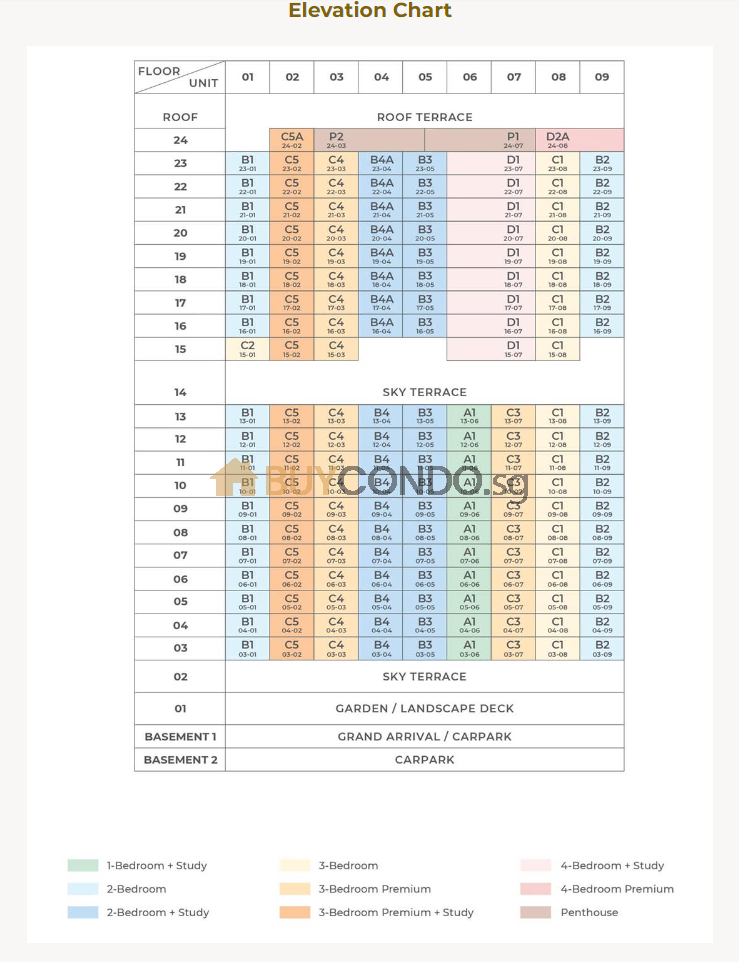
Introduction to Arcady Condo: A New Freehold Development
Arcady Condo is an exciting addition to Singapore’s real estate landscape, offering a new freehold development that combines modern living with tranquil surroundings. With its strategic location, contemporary design, and serene ambiance, Arcady Condo presents an attractive residential option for those seeking a harmonious blend of convenience and serenity.
About Arcady Condo’s Strategic Location
Situated in a highly sought-after location, Arcady Condo provides residents with easy access to a plethora of amenities and transportation options. The condominium is strategically positioned near transportation hubs, including the Boon Keng MRT station, allowing residents to connect effortlessly to various parts of Singapore. Additionally, the surrounding area boasts an abundance of shopping centers, educational institutions, and recreational facilities, ensuring that residents have everything they need within reach.
Contemporary Design Meets Serenity
Arcady Condo sets itself apart with its contemporary design that seamlessly integrates with the serene environment. The development features modern architectural elements, complemented by lush green spaces and landscaped gardens. This unique combination creates a soothing and inviting atmosphere, providing residents with a sanctuary amidst the bustling cityscape.
The design of Arcady Condo prioritizes both aesthetic appeal and functionality. The interiors of each unit are thoughtfully crafted to maximize space and natural light, offering residents a comfortable and harmonious living experience. Whether relaxing in their own private space or enjoying the communal areas, residents can unwind and rejuvenate in the tranquil ambiance of Arcady Condo.
Arcady Condo’s Location: The Gateway to Convenience
Arcady Condo is situated at the prime location of 1037 Serangoon Road, providing residents with unparalleled convenience. Its strategic position near Boon Keng MRT station and major expressways allows for seamless commuting to various parts of Singapore. Whether you’re headed to the bustling city center or exploring the tranquil outskirts, Arcady Condo offers easy access to it all.
But the convenience of Arcady Condo extends beyond transportation. The surrounding area is a paradise for modern city dwellers, offering a plethora of amenities at your fingertips. Immerse yourself in retail therapy at nearby shopping malls, indulge in a diverse culinary scene, or enroll your children in reputable schools – all just a stone’s throw away from your doorstep.
Living at Arcady Condo means embracing a lifestyle of utmost convenience and accessibility. Every day will be filled with endless opportunities, as you seamlessly navigate the city and enjoy the myriad of amenities that surround you. Welcome to the gateway of convenience – welcome to Arcady Condo.
Maximizing Comfort with Modern Facilities
Arcady Condo takes comfort to a whole new level with its range of modern facilities. Residents can indulge in luxurious amenities that are designed to enhance their quality of life. Whether it’s relaxing by the pool, working out in the state-of-the-art gym, or unwinding in the lush gardens, there is always a space for residents to rejuvenate and recharge.
Furthermore, Arcady Condo offers convenience at every turn. Residents can enjoy the convenience of an in-house concierge service, dedicated parking spaces, and 24-hour security, ensuring their safety and peace of mind. With these modern facilities, Arcady Condo sets the benchmark for comfortable and convenient living.
| Architectural Brilliance | Innovative Design | Eco-Friendly Features | Modern Facilities |
|---|---|---|---|
| Elegant and visually stunning | Harmonious blend of aesthetics and functionality | Energy-efficient materials and technologies | Luxurious amenities for residents to enjoy |
| Sleek and modern facade | Thoughtfully designed interior spaces | Reduced carbon footprint | In-house concierge service |
| Creates a sustainable living environment | Elevates the living experience | Convenience and comfort at every turn | Dedicated parking spaces |
Arcady Condo at Boon Keng MRT Review
As a prospective homebuyer, finding the perfect place to call home can be a daunting task. That’s why Arcady Condo at Boon Keng MRT is a haven for those looking for a quality living experience in Singapore. With its range of unit choices, attractive location, and unique features, Arcady Condo sets itself apart from other developments in the area.
One of the key factors that make Arcady Condo a desirable choice for prospective homebuyers is its strategic location. Situated at 1037 Serangoon Road, this condominium offers unparalleled convenience with its proximity to amenities and excellent transportation options. Whether you need to commute to work or enjoy a day of shopping, everything you need is just a stone’s throw away.
What truly sets Arcady Condo apart from the rest is its commitment to providing residents with a premium living experience. The development features state-of-the-art facilities and thoughtful design that prioritizes comfort and luxury. From the moment you step into Arcady Condo, you’ll be greeted by an inviting ambiance that exudes modern elegance.
“Arcady Condo offers the perfect blend of convenience, connectivity, and comfort. It’s like finding your own slice of paradise amidst the bustling city.”
| Prospective Homebuyers’ Haven | What Sets Arcady Condo Apart |
|---|---|
|
|
Embracing Lifestyle at Arcady Condo: Amenities and Facilities
Arcady Condo understands the importance of providing residents with a holistic and fulfilling living experience. That’s why we offer a wide range of amenities and facilities that cater to the diverse needs and preferences of our residents.
One of the highlights of Arcady Condo is the inviting swimming pool. Whether you enjoy a refreshing morning swim or a relaxing dip after a long day, our pool is the perfect place to unwind and rejuvenate. With its crystal-clear waters and serene surroundings, it’s like having a private oasis right at your doorstep.
In addition to the pool, we also have a state-of-the-art gym that is well-equipped with the latest fitness equipment. Stay in shape and maintain an active lifestyle without having to leave the comfort of the condo. Our gym is designed to meet all your fitness needs and offers a wide range of facilities and programs.
For those who enjoy spending time outdoors, our lush gardens provide a serene and tranquil retreat. Take a leisurely stroll along the landscaped pathways, surrounded by lush greenery that soothes the soul and calms the mind. It’s the perfect escape from the hustle and bustle of city life.
At Arcady Condo, we believe that social connections are just as important as physical well-being. That’s why we have created communal spaces where residents can gather and interact. Whether it’s the clubhouse, BBQ pits, or outdoor seating areas, these spaces are perfect for hosting gatherings and creating lasting memories with family and friends.
Our amenities and facilities are thoughtfully designed with your lifestyle in mind, ensuring that you have everything you need to live life to the fullest at Arcady Condo.
Affordability Meets Luxury: Arcady Condo Price Analysis
Arcady Condo stands out for its unique combination of affordability and luxury. In this section, I will analyze the price structure of this development, providing valuable insights into its value for money. Additionally, I will compare the prices of Arcady Condo with those of nearby condominiums, highlighting its competitive pricing and attractive investment potential.
Understanding the Price Quantum in Boon Keng
When it comes to choosing a property, understanding the price quantum is crucial for making an informed decision. Arcady Condo offers a diverse range of units, from 1 to 4 bedrooms, catering to the needs of individuals and families alike. The pricing structure is designed to provide affordability without compromising on quality and luxury. By carefully evaluating the price quantum in Boon Keng, prospective buyers can determine the value they will receive from their investment.
A Comparison with Nearby Condominiums
To truly understand the competitive advantage of Arcady Condo, it’s important to compare it with other condominiums in the vicinity. By analyzing the price differentials and features of nearby developments, we can ascertain the value proposition that Arcady Condo offers to potential buyers. This comparison will shed light on how affordability meets luxury at Arcady Condo, making it a standout choice in the market.
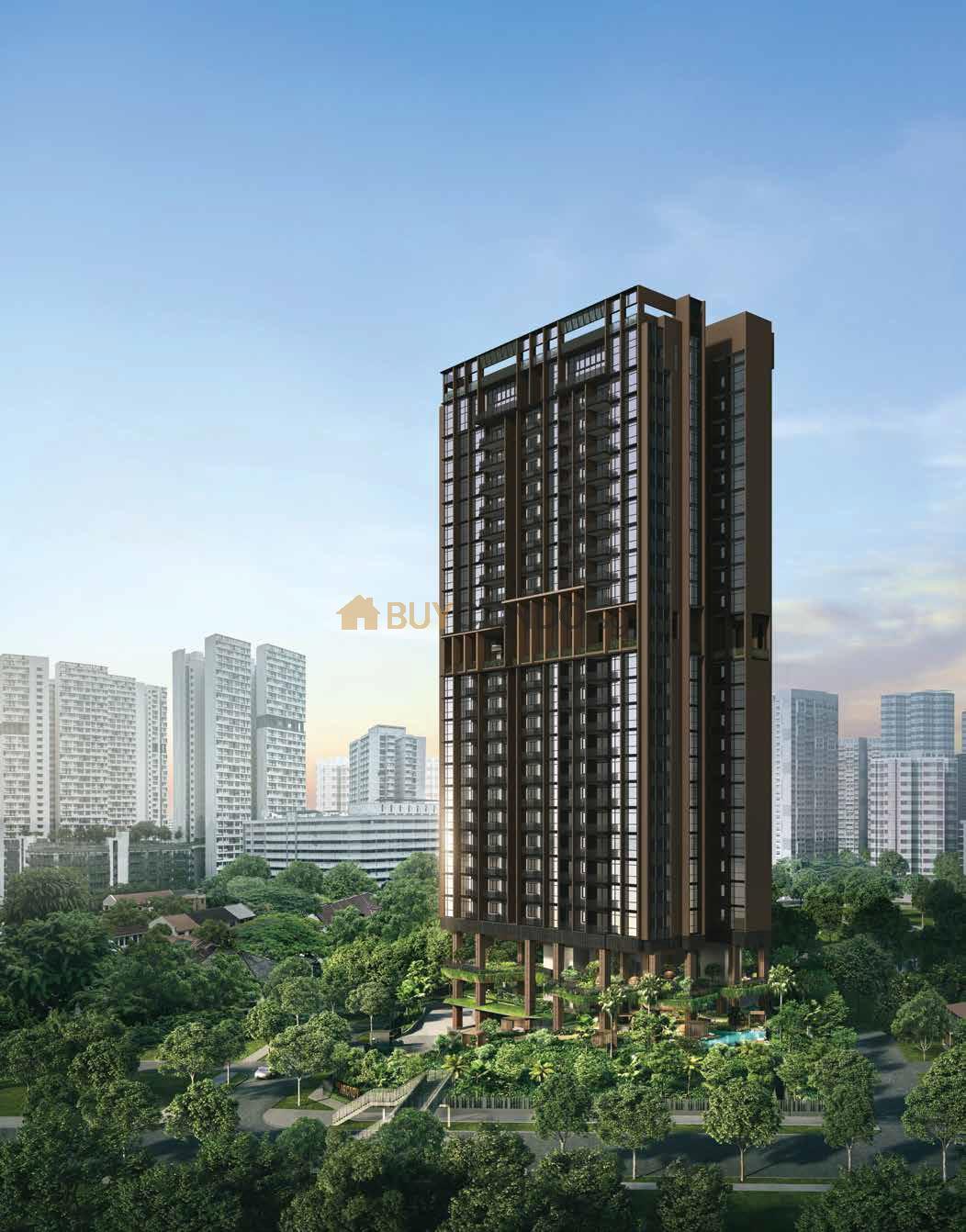
Arcady Condo Pricing
The price range of units for sale in The Arcady At Boon Keng is between S$1,200,000 – S$6,400,000 displayed in propertyguru.
Investing in Arcady Condo: A Smart Choice?
When it comes to making investment decisions, we all want to make the smart choice – the one that promises long-term value and attractive returns. In the case of Arcady Condo, this choice seems even smarter. Let’s explore why.
Long-Term Value of Freehold Properties
Investing in freehold properties, such as Arcady Condo, is a proven strategy to secure long-term value in the Singapore property market. With freehold ownership, you gain stability, as you have full control and ownership of your property, free from any leasehold constraints. Freehold properties also tend to appreciate in value over time, offering potential capital gains when you decide to sell in the future.

Rental Yield Prospects in District 12
For investors seeking rental income, Arcady Condo presents an enticing opportunity. Located in the highly sought-after District 12, the condo enjoys excellent rental yield prospects. The central location, combined with the proximity to amenities and transportation options, makes it a desirable choice for tenants. This increases the potential for steady rental income and favorable returns on investment.
Conclusion
In my opinion, Arcady Condo at Boon Keng MRT is more than just a residential development—it’s a lifestyle choice. The strategic location, contemporary design, and array of amenities make it a standout option for both homebuyers and investors.
For homebuyers, Arcady Condo offers the best of city-fringe living in Singapore. Its convenient location near Boon Keng MRT station provides easy access to transportation, allowing residents to explore the city with ease. The contemporary design of the development creates a serene and inviting atmosphere, perfect for those seeking a peaceful retreat.
Investors will also find Arcady Condo to be a smart choice. Freehold properties like Arcady Condo tend to hold their value well over time, offering long-term stability and potential appreciation. Additionally, the rental yield prospects in District 12 are promising, making Arcady Condo an attractive investment opportunity.
In conclusion, Arcady Condo at Boon Keng MRT offers a unique blend of convenience, modern design, and attractive amenities. Whether you’re looking for a new home or an investment opportunity, Arcady Condo is definitely worth considering. So why settle for ordinary when you can have an exceptional living experience at Arcady Condo?
FAQ
What is the location of Arcady Condo at Boon Keng MRT?
Arcady Condo is located at 1037 Serangoon Road, offering residents unparalleled convenience.
What types of units are available at Arcady Condo?
Arcady Condo offers a mix of 1 to 4-bedroom units, catering to both individuals and families.
What amenities and facilities are available at Arcady Condo?
Arcady Condo offers a wide range of amenities and facilities, including a swimming pool, gym, lush gardens, and communal spaces.
What is the pricing structure of Arcady Condo?
For information on the pricing structure of Arcady Condo, it is best to refer to the price analysis and comparison with nearby condominiums.
Is investing in Arcady Condo a smart choice?
Investing in Arcady Condo is considered a smart choice due to its long-term value potential and attractive rental yield prospects.
What sets Arcady Condo apart from other developments in the area?
Arcady Condo stands out from other developments in the area due to its range of unit choices, attractive location, and unique features.
The post Arcady Condo at Boon Keng MRT Review appeared first on Wing Tai Holdings Singapore.
]]>The post How to Succeed as a Real Estate Agent in 2024 (Practical Advice) appeared first on Wing Tai Holdings Singapore.
]]>TLDR: Real estate agents in 2024 should focus on productivity, prospecting, lead follow-up, and negotiating contracts and join communities.
Key insights : How to Succeed as a Real Estate Agent in 2024 (Practical Advice)
 Prospecting and lead generation are crucial for success in real estate, regardless of the method used.
Prospecting and lead generation are crucial for success in real estate, regardless of the method used. It’s not like shooting fish in a barrel, it’s like shooting fish in a bucket – take advantage of the least competitive day in real estate.
It’s not like shooting fish in a barrel, it’s like shooting fish in a bucket – take advantage of the least competitive day in real estate. The highest priority lead source for agents looking to sell is for Serious Sellers, as 100% of them have raised their hand and expressed interest in selling their home.
The highest priority lead source for agents looking to sell is for Serious Sellers, as 100% of them have raised their hand and expressed interest in selling their home. Mindset is like the tires to a $500,000 car – if you have a flat tire, you’re not really going to go anywhere.
Mindset is like the tires to a $500,000 car – if you have a flat tire, you’re not really going to go anywhere. Consistent follow-up is key to success in real estate, even if it takes weeks or even years to see results.
Consistent follow-up is key to success in real estate, even if it takes weeks or even years to see results. Persistence is key in real estate, even when it feels like you’re close to giving up.
Persistence is key in real estate, even when it feels like you’re close to giving up. Showing up early to a listing appointment can make a huge difference in winning the client’s trust and getting the listing.
Showing up early to a listing appointment can make a huge difference in winning the client’s trust and getting the listing. Working on your skills, prospecting, and lead follow-up should make up 80% of your day as a real estate agent.
Working on your skills, prospecting, and lead follow-up should make up 80% of your day as a real estate agent. Building and utilizing a strong database is crucial for generating business as a real estate agent.
Building and utilizing a strong database is crucial for generating business as a real estate agent.
 Real estate agents in 2024 should focus on productivity, negotiating contracts, prospecting, and lead follow-up, emphasizing reaching out to cold leads.
Real estate agents in 2024 should focus on productivity, negotiating contracts, prospecting, and lead follow-up, emphasizing reaching out to cold leads.
(Dont just wait for the leads turn warm or referrals)
To succeed as a real estate agent, focus on productivity by working on skills, prospecting, and lead follow-up.
Real estate agents must prioritize negotiating contracts, prospecting in the morning, and scheduling appointments in the afternoon for maximum productivity.
 Reach out to prospects ready to buy after the holidays, overcome objections, and be proactive in reaching potential sellers early in the year to get ahead of the competition.
Reach out to prospects ready to buy after the holidays, overcome objections, and be proactive in reaching potential sellers early in the year to get ahead of the competition.
Agents need to converse with prospects ready to buy after the holidays, using powerful questions for effective follow-up.
It is overcoming objections and conditions as a real estate agent by emphasizing the benefits of going on the market now versus waiting until next year.
Be proactive and reach out to potential sellers early in the year to get ahead of the competition.
Don’t wait for perfect conditions; take action now and reap the benefits.
 Real estate agents should avoid being pushy and instead use suggestive selling techniques, focus on lead sources, and be prepared for potential changes in buyer commissions to succeed in 2024. Collapse
Real estate agents should avoid being pushy and instead use suggestive selling techniques, focus on lead sources, and be prepared for potential changes in buyer commissions to succeed in 2024. Collapse
Real estate agents should avoid being pushy and use suggestive selling techniques to avoid being perceived as aggressive salespeople.
The key to succeeding as a real estate agent is to avoid being pushy and instead ask questions to guide potential clients toward their ideal property.
Focus on lead sources like for sale by owners if you want to transition from working with buyers to working with sellers as a real estate agent.
Utilize lead generation sources such as community data, expired listings, and personal databases to provide updates and services to friends and family to succeed as a real estate agent.
Focus on the top three sources for real estate leads, and be prepared to address objections from sellers who want to avoid paying the standard commission to get buyers to be willing to be open about paying commission if we can secure an apartment or flat of a good buy and why want to wait for the price to come down.
 Master the sales language, Form small groups for Roleplay sessions and Mastermind opportunities, and positively spin current interest rate situations when working with buyers.
Master the sales language, Form small groups for Roleplay sessions and Mastermind opportunities, and positively spin current interest rate situations when working with buyers.
Mastering the language of sales is crucial for success as a real estate agent, so start working on it now and ask any specific questions in the comments.
Interest rates fluctuate, but it’s important to spin the current situation positively when working with buyers as a real estate agent.
Start to lock in your interest rates, take advantage of lower rates and less competition, and be prepared to refinance if rates drop, presenting the opportunity differently to clients.

 Focus on mindset, skills, and consistent action, avoid burnout, and be cautious of whom you take advice from in the real estate industry.
Focus on mindset, skills, and consistent action, avoid burnout, and be cautious of whom you take advice from in the real estate industry.
Put a schedule in place, use an Excel spreadsheet to list tasks, focus on completing tasks before adding more, and then introduce specific task times.
Focus on mindset and be cautious of who you take advice from, as everyone labels themselves as a coach nowadays.
Focus on mindset, skills, activities, and actions as a real estate agent, with attitude being crucial for success and requiring constant attention and maintenance.
Agents often start strong with plans to make calls and be proactive but quickly become discouraged and lose motivation, so the speaker advises addressing this issue.
Success in real estate takes time and effort, just like getting six-pack abs, and it’s essential not to give up when feeling burnt out.
Focus on gradual progression and consistency in prospecting and business strategies to avoid burnout and achieve long-term success as a real estate agent.
 Join a community for training, build relationships with for-sale owners, be persistent in follow-up, focus on organic team growth, and prioritize prospecting for success as a real estate agent.
Join a community for training, build relationships with for-sale owners, be persistent in follow-up, focus on organic team growth, and prioritize prospecting for success as a real estate agent.
Improve your communication, tonality, and roleplaying skills by joining a community or group for feedback and training sessions.
Converting for sale by owners takes time and patience, with relationship building essential for success.
Consistent follow-up is necessary to meet with potential clients, which can take several weeks, and it’s important to stay persistent and not give up.
To succeed as a real estate agent, focus on organic team growth and wait until you have a particular production level before bringing on new agents.
Importance of prospecting and recommends books for developing a powerful mindset.
 Invest in a coach, establish a tight schedule, prioritize prospecting, and avoid ego-driven behavior to succeed as a real estate agent in 2024.
Invest in a coach, establish a tight schedule, prioritize prospecting, and avoid ego-driven behavior to succeed as a real estate agent in 2024.
Invest in a coach or mentor, avoid ego-driven behavior, and establish a tight schedule to succeed as a real estate agent.
Successful real estate agents have a specific schedule, discipline, and commitment; giving it your all before giving up is essential.
Show up on time for listing appointments, do your homework, and show up for important meetings.
Comparing and contrasting on social media can lead to negativity and unrealistic expectations, so real estate agents need to focus on their own efforts and take breaks from social media when required.
Join the group for roleplay sessions, implement the information provided, and focus on money-making activities.
Focus on improving your skills, prioritize prospecting and lead follow-up, and dedicate 80% of your day to these activities to succeed as a real estate agent.

 Focus on money-making activities like prospecting and door-knocking, set high standards, prioritize safety, mindset, and relationships, and invest in real estate training for success in 2024.
Focus on money-making activities like prospecting and door-knocking, set high standards, prioritize safety, mindset, and relationships, and invest in real estate training for success in 2024.
Focus on investing time in money-making activities, such as prospecting and being on the phones, to succeed as a real estate agent.
Set high standards for yourself, put in the work, and don’t make excuses – door-knocking is a cost-effective way to succeed as a real estate agent.
Be knowledgeable about safe areas, bring a buddy or take safety precautions, and maintain distance when door-knocking as a female real estate agent.
Encourage real estate agents to join a personal development group prioritize mindset and schedule, and connect with other agents before the new year.
Have a schedule, build a database of contacts, and prioritize relationships with friends, family, past clients, and business contacts to succeed as a real estate agent.
The post How to Succeed as a Real Estate Agent in 2024 (Practical Advice) appeared first on Wing Tai Holdings Singapore.
]]>The post Newly MOP HDB vs Older Resale HDB appeared first on Wing Tai Holdings Singapore.
]]>Hey there, homebuyers! Are you ready to dive into the exciting world of HDB flats in Singapore? Well, get ready for a dilemma! When it comes to purchasing a home, Singaporeans face a tough choice between newly MOP HDB flats and older resale HDB flats. It’s a decision that can make your head spin faster than a ferris wheel in Marina Bay Sands.

But fear not, my fellow homebuyers, for I am here to shed some light on this perplexing predicament. In this article, we’ll explore the factors that you need to consider in order to make an informed decision. From the core differences between newly MOP HDB flats and older resale HDB flats to the impact of the Minimum Occupation Period (MOP) on property value, we’ve got you covered.
So strap in, grab your kopi from the nearest kopi tiam, and let’s embark on this HDB adventure together!
Key Takeaways:
- Choosing between newly MOP HDB flats and older resale HDB flats can be a daunting task for homebuyers in Singapore.
- Factors such as property age, lease considerations, and pricing differentiate these two options.
- The Minimum Occupation Period (MOP) plays a significant role in the value and eligibility of HDB flats.
- Consider your life stage, room requirements, and investment potential when making your decision.
- Don’t forget to factor in amenities, location, and long-term returns to ensure a well-rounded evaluation.
Introduction: The Quest for Affordable Homeownership in Singapore
Affordable homeownership is no small feat in Singapore, where the high cost of real estate has left many aspiring homeowners grappling with the challenge of finding a place to call their own. As a homebuyer in Singapore, the dream of owning a property that meets both your budget and your needs requires careful consideration and a thorough understanding of the housing market. In this article, we will explore the various factors that contribute to the affordability of homeownership in Singapore, helping you navigate the complexities of the real estate landscape.
One of the key drivers behind the quest for affordable homeownership is the significant financial burden that comes with purchasing a property. The demand for housing in Singapore, coupled with limited land availability, has driven property prices to unprecedented heights. As a result, many homebuyers find themselves in a constant struggle to secure a home that fits their budget without compromising on quality and location.
“Affordable homeownership is not just about finding a property at a lower price. It’s about finding a balance between price, location, and the long-term financial implications of owning a home,” says John Tan, a real estate expert in Singapore.
In addition to the financial aspects, the scarcity of available housing options also contributes to the challenge of affordable homeownership. Singapore’s housing market is primarily dominated by public housing, known as HDB (Housing and Development Board) flats, which are typically more affordable compared to private properties. However, factors such as location, size, and leasehold status further influence their price and availability.
Despite these challenges, the Singaporean government has implemented various measures to support and promote affordable homeownership. These include grants, subsidies, and loan schemes aimed at helping first-time homebuyers overcome financial barriers. Additionally, the government has introduced policies to ensure a balanced and sustainable housing market, such as the Minimum Occupation Period (MOP) requirement for HDB flats.
Throughout this article, we will explore the factors that influence affordable homeownership in Singapore, providing insights and practical advice to help you make informed decisions in your quest for the perfect home. From understanding the core differences between newly MOP HDB flats and older resale HDB flats, to evaluating lease considerations and exploring property value trends across different regions, we will guide you through the complexities of the Singapore property market. So, let’s dive in and discover the path to affordable homeownership in Singapore!
Newly MOP HDB vs. Older Resale HDB: The Core Differences
When it comes to purchasing a home in Singapore, there is a crucial decision that homebuyers have to make: choosing between newly Minimum Occupation Period (MOP) HDB flats and older resale HDB flats. Understanding the core differences between these two options is essential in making an informed choice.
To begin with, one of the key distinctions between newly MOP HDB flats and older resale HDB flats is their property age. Newly MOP HDB flats typically refer to those that have completed the MOP period and are ready for occupancy, while older resale HDB flats have been previously owned and can vary in terms of age and condition.
Another critical factor to consider is the lease. Newly MOP HDB flats generally come with a longer remaining lease, offering more years of ownership. On the other hand, older resale HDB flats may have a shorter remaining lease, which could impact their value and the ability to secure financing.
Pricing is also an important aspect to compare. Newly MOP HDB flats tend to have a higher price due to their newer condition and longer remaining lease. Older resale HDB flats, on the other hand, may come at a relatively lower price, taking into account factors such as property age and remaining lease.
Understanding these core differences between newly MOP HDB flats and older resale HDB flats is crucial for homebuyers to evaluate and prioritize their needs and preferences. Whether it’s prioritizing a longer remaining lease, a lower price, or a newer property, each option has its own advantages and considerations.
Ultimately, the choice between newly MOP HDB flats and older resale HDB flats will depend on individual circumstances, financial capabilities, and future plans. It is recommended to carefully evaluate these factors and seek professional advice before making a decision.
Visual representation of the core differences between newly MOP HDB and older resale HDB.
| Factors | Newly MOP HDB | Older Resale HDB |
|---|---|---|
| Property Age | Newer | Varies |
| Lease | Longer Remaining Lease | Shorter Remaining Lease |
| Pricing | Higher | Relatively Lower |
Understanding the Minimum Occupation Period (MOP) and Its Impact on Property Value
When considering the purchase of a newly MOP HDB flat or an older resale HDB flat, it is essential to understand the concept of the Minimum Occupation Period (MOP) and its influence on property value. The MOP is a crucial factor that directly affects the marketability and value of your home.
What is MOP and Why Does It Matter?
The Minimum Occupation Period (MOP) refers to the mandatory period during which HDB flat owners are required to live in their property before they are eligible to sell or rent it out. This policy aims to ensure stable communities and provide homeowners with the opportunity to establish roots in their neighborhood. The MOP duration typically ranges from 5 years.
“The MOP is like a commitment period, where homeowners are encouraged to settle down and contribute to the community without the distractions of property speculation.”
During the MOP, homeowners are not allowed to sell, transfer ownership, or rent out their flat. Violating the MOP regulations can result in penalties or legal repercussions. Therefore, it is crucial to understand and comply with the MOP guidelines to avoid any complications in the future.
The Influence of MOP on Newly Acquired HDBs
For those looking to purchase a newly MOP HDB flat, it is important to consider the impact of the MOP on the property value. Newly MOP HDB flats are still within the MOP period, which means that their marketability is limited. Buyers who plan to sell the flat before the MOP ends may face challenges in finding potential buyers due to the restrictions imposed.
However, it’s worth noting that once the MOP period is over, the value and marketability of the HDB flat may increase significantly. The completion of the MOP allows homeowners to explore various options, such as selling or renting out the property, thereby increasing its potential value. Additionally, being in a mature estate or a desirable location can further enhance the overall value of the HDB flat once the MOP is fulfilled.
| MOP Status | Implications on Property Value |
|---|---|
| Before MOP | Limited marketability and restricted selling options |
| After MOP | Potential increase in value and marketability, more selling and renting options available |
As with any property investment, it is important to consider your long-term goals and financial capability when deciding between newly MOP HDB flats and older resale HDB flats. Understanding the MOP and its implications on property value can help you make a more informed decision.
https://buycondo.sg/hdb-vs-private-condominium-which-is-more-significant/
Evaluating Property Lifespan: Lease Considerations for HDB Flats
When considering purchasing an HDB flat, it is essential for homebuyers to evaluate the lifespan of the property and take into account the lease considerations. The property lifespan and lease remaining on HDB flats can significantly impact the value and longevity of the property, making it a crucial factor in the decision-making process.
One of the key aspects to consider is the remaining lease on the HDB flat. HDB flats have a lease of 99 years, and it is important to assess how many years are left on the lease before making a purchase. The lease remaining affects both the potential resale value of the property and the buyer’s ability to enjoy the property over the long term.
With a shorter lease remaining, the property may become less desirable in the resale market as its value decreases over time. Additionally, as the lease gets closer to expiry, the HDB flat may become less attractive to potential buyers, making it harder to sell in the future. Therefore, considering the lease remaining is crucial for buyers who are looking for a property with long-term investment potential.
However, it’s important to note that the remaining lease does not solely determine the value of an HDB flat. Other factors such as location, amenities, and the overall condition of the flat also play a significant role. Buyers should evaluate the lease considerations in conjunction with these factors to make a well-rounded assessment of the property’s value and potential.
Moreover, for buyers who plan to live in the HDB flat for the entire lease duration, the remaining lease may be less of a concern. In such cases, the focus may be more on the suitability of the flat for the buyer’s current and future needs, rather than its potential resale value.
“The lease considerations for HDB flats require careful evaluation. It’s not just about the number of years remaining, but also the overall condition, location, and amenities of the property. It’s important to find the right balance that aligns with your long-term goals and preferences.”
| Lease Considerations | Impact |
|---|---|
| Shorter remaining lease | – Decreased resale value – Potential difficulty in finding buyers – Limited long-term investment potential |
| Longer remaining lease | – Higher resale value – Increased attractiveness to potential buyers – Extended long-term investment potential |
| Living in the property for entire lease duration | – Focus on suitability for current and future needs – Resale value may be of less priority |
Assessing the property lifespan and taking lease considerations into account is a critical step in making an informed decision when buying an HDB flat. By carefully evaluating the remaining lease and considering other factors that influence the value of the property, homebuyers can ensure that their investment aligns with their long-term goals and preferences.
Life Stages and Housing Choices: From Singles to Young Families
Different life stages present unique housing challenges and considerations. As individuals transition through various stages of life, their housing needs and preferences naturally evolve. From singles seeking youthful independence to young families in need of space and stability, each life stage brings its own set of housing choices.
When Youthful Independence Clashes with Housing Rules
Singles often value their independence and desire a housing arrangement that aligns with their lifestyle. However, in Singapore, housing rules can pose challenges for single individuals. The Housing and Development Board (HDB) sets specific eligibility criteria for purchasing certain types of housing, such as public housing flats. Singles may face restrictions or limitations when it comes to buying a home that suits their preferences.
However, there are alternative housing choices available for singles in Singapore. Private rental options, such as condominiums or apartments, provide greater flexibility and fewer restrictions compared to HDB flats. These options allow singles to enjoy the freedom and independence they desire without being confined by the housing rules that apply to public housing. Additionally, co-living arrangements are gaining popularity among singles, offering a cost-effective and communal living experience.
Advantages for Married Couples in the HDB Market
Married couples, on the other hand, often enjoy certain advantages in the HDB market. The HDB offers various housing schemes and grants specifically designed for married couples, making it easier for them to own a home. These schemes include the Married Child Priority Scheme, the Parenthood Priority Scheme, and the Proximity Housing Grant, among others.
Married couples can also benefit from the stability and affordability of HDB flats. HDB estates typically provide a range of amenities, such as schools, parks, and community centers, which are ideal for families with young children. The strong sense of community within HDB estates can also contribute to a fulfilling family-oriented lifestyle.
Ultimately, the housing choices available to singles and young families depend on individual circumstances, preferences, and financial capabilities. Considering the clash between youthful independence and housing rules for singles, as well as the advantages offered to married couples in the HDB market, can help individuals make informed decisions about their housing options.

Envisioning Your Long-Term Residence: Newly MOP-ed HDB vs. Aging Resale Options
Projection of Home Value Over Time
When choosing between newly MOP-ed HDB flats and aging resale options, it’s essential to consider the projection of home value over time. Investing in a property is a long-term decision, and understanding how it may appreciate or depreciate in value can have a significant impact on your financial future.
Considering Comfort and Community Ties in Your Decision
It’s not just about the monetary aspect when deciding between newly MOP-ed HDB flats and aging resale options. The comfort and sense of belonging that come with living in a community should also play a crucial role in your decision-making process.
When you envision your long-term residence, think about the amenities, facilities, and neighborhood characteristics that matter most to you. Are you looking for a vibrant, bustling neighborhood with a diverse range of shops and restaurants? Or do you prefer a quieter, close-knit community with plenty of green spaces for relaxation?
Consider the proximity to essential amenities such as schools, healthcare facilities, and transportation options. Furthermore, think about the availability of recreational centers, parks, and community spaces that foster social interaction and the building of lasting relationships with your neighbors.
Your long-term residence isn’t just a physical structure; it’s where you’ll create memories, forge friendships, and establish community ties. Don’t underestimate the importance of finding a place that aligns with your lifestyle and offers the support and camaraderie that contribute to a fulfilling living experience.
With the projection of home value over time and the consideration of comfort and community ties, you’ll be better equipped to make an informed decision about your long-term residence. So take the time to analyze the factors that matter most to you and choose the option that aligns with your goals and aspirations.
Size Matters: Room Requirements for Different Buyer Profiles
When it comes to purchasing a home, the size of the rooms can make a big difference. Homebuyers have different room requirements based on their profiles, and it’s important to consider these needs before making a decision.
For families with children, spacious bedrooms are a top priority. Kids need space to play, study, and grow. Having enough room for a bed, a desk, and storage is essential for their comfort and development.
On the other hand, young professionals or couples without children may prioritize a home office or a spare room for hobbies. Whether it’s for remote work, creative pursuits, or a small home gym, having an extra space can enhance the overall livability of the home.
For elderly individuals or those with mobility challenges, a well-designed bedroom and bathroom that are easily accessible and can accommodate assistive devices can greatly improve comfort and quality of life.
Decoding the Singapore Property Market: Ideal Regions for HDB Flats
When it comes to investing in HDB flats, understanding the Singapore property market is crucial. Different regions offer unique advantages and property value trends that can greatly impact your investment decision. In this section, I will help you decode the Singapore property market and identify the ideal regions for HDB flats.
Property Value Trends Across Different Regions
The property value trends across different regions in Singapore can vary significantly. Factors such as location, amenities, and accessibility can greatly influence the value of HDB flats. It’s important to consider both current market conditions and potential future developments when assessing property value trends.
To illustrate the varying property value trends, let’s take a look at the following table:
| Region | Average HDB Flat Price | Property Value Trend |
|---|---|---|
| Central Region | $800,000 | Stable |
| North Region | $450,000 | Stable |
| East Region | $550,000 | Slightly increasing |
| West Region | $450,000 | Moderately increasing |
As you can see, the Central Region has experienced rapid property value growth, making it an ideal region for HDB flat investments. The North and East Regions offer stability and moderate growth, while the West Region provides more affordable options with moderate value increases. Understanding these trends can help you make an informed decision based on your budget and investment goals.
Finding the Sweet Spot: Location vs. Property Age
When choosing an ideal region for your HDB flat, it’s important to strike a balance between location and property age. While a prime location can offer convenience and potential for higher property value appreciation, the age of the property plays a significant role in maintenance costs and potential renovations.
Remember, it’s not just about the location – it’s about finding the sweet spot where location aligns with your property age preferences.
For example, if you prefer a vibrant city lifestyle, the Central Region might be your sweet spot, where newer developments offer modern amenities and easy access to downtown attractions. On the other hand, if you value a more tranquil environment and are willing to invest in renovations, an older HDB flat in the North Region might be suitable for you.
By carefully considering the location and property age, you can find the sweet spot that aligns with your lifestyle, budget, and long-term investment goals.
Considering Renovations: Additional Costs for Your Dream Home
When it comes to purchasing your dream home, renovations can be a crucial factor to consider. While you may have found the perfect HDB flat, it’s important to evaluate the additional costs and financial implications that come with upgrading and personalizing your space.
Determining Your Readiness for Property Makeovers
Before diving into renovations, it’s essential to assess your readiness for property makeovers. Consider the following factors:
- Time: Renovations require time and effort. Assess whether you have the bandwidth to manage the process or if you need to hire professionals.
- Budget: Establish a realistic budget for your renovation project. Evaluate your financial readiness and ensure you have sufficient funds to cover the additional costs.
- Personal Preferences: Understand your design preferences and the extent of changes you desire. Determine if you’re open to minor upgrades or if you’re looking for a complete overhaul.
- Practical Considerations: Evaluate the practicality of renovations, taking into account your lifestyle, family needs, and any future plans that may affect the longevity of the improvements.
By carefully considering these factors, you can determine if you’re truly ready to take on property makeovers and make an informed decision based on your individual circumstances.
The Financial Implications of Upgrading an HDB Flat
Upgrading an HDB flat involves financial implications that should not be overlooked. Apart from the cost of the renovations themselves, there are other considerations to keep in mind:
- Additional Costs: Renovations often come with unforeseen expenses such as permits, contractor fees, and potential delays. Factor in these additional costs to avoid any surprises.
- Value-Added: While renovations can enhance your living experience, it’s important to assess whether they will add value to your HDB flat. Consider the potential increase in property value and the overall market demand for upgraded units in your area.
- Selling or Renting: If you plan to sell or rent out your HDB flat in the future, evaluate the return on investment (ROI) of your renovations. Will the upgrades significantly impact the rental or resale value of your property?
Understanding the financial implications of upgrading an HDB flat will help you make smart decisions and ensure you stay within your budget while still achieving your dream home.
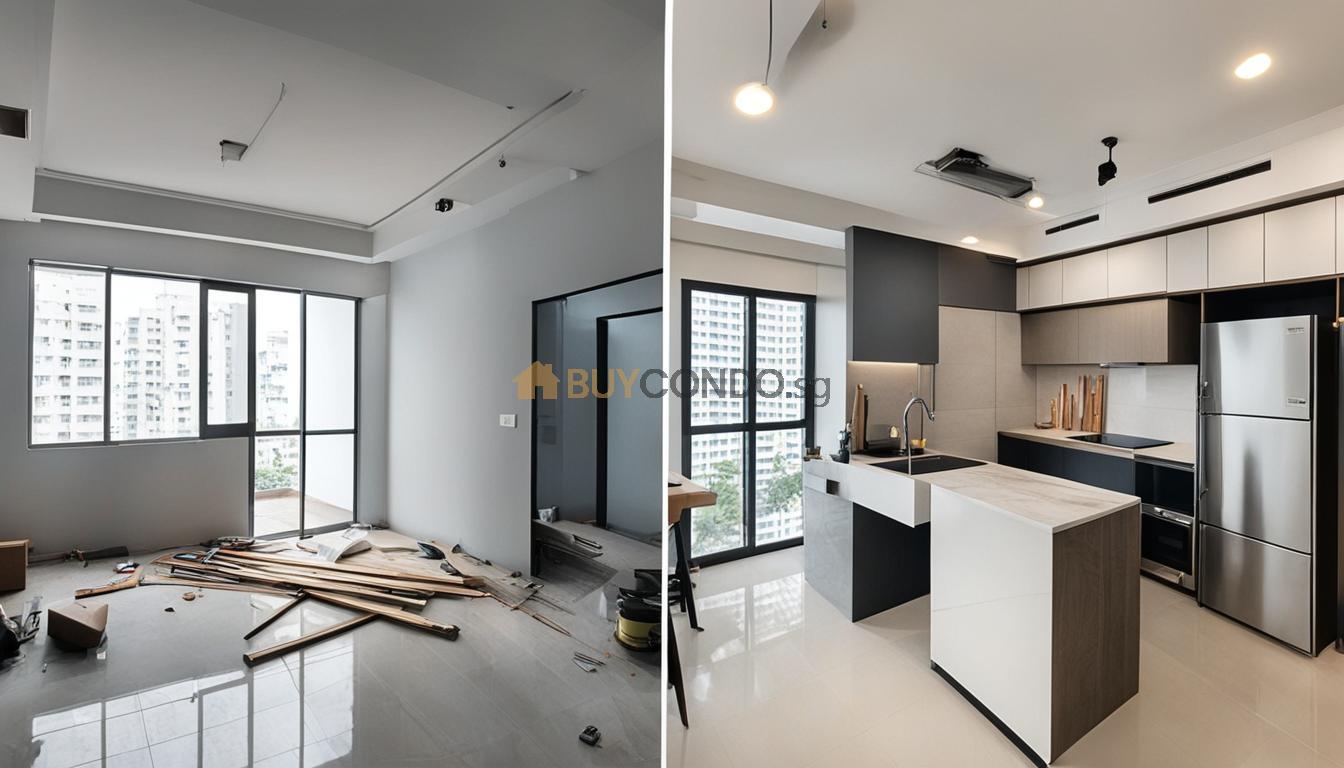
Amenity Considerations: What’s Important in Your HDB Living Experience?
When it comes to choosing the perfect HDB flat, amenity considerations can make all the difference in creating a comfortable and convenient living experience. As a savvy homebuyer, it’s important to evaluate the amenities available in the surrounding area and within the HDB estate itself to ensure you’re making the right decision.
One of the key amenity considerations is the proximity to essential facilities such as schools, healthcare centers, and shopping malls. Having these amenities nearby can greatly enhance your daily life, offering convenience and accessibility to everything you need.
Furthermore, recreational amenities play a significant role in improving your overall living experience. Look out for nearby parks, sports facilities, and community centers that offer opportunities for leisure activities, exercise, and socializing. These amenities not only promote a healthier lifestyle but also encourage a sense of community and connection.
In addition to external amenities, it’s important to consider the facilities within the HDB estate itself. Many newer HDB flats come equipped with a wide range of facilities such as playgrounds, fitness corners, and swimming pools. These on-site amenities provide convenience and entertainment right at your doorstep, ensuring that there’s always something to do within the estate.
When assessing amenity considerations, it’s essential to prioritize your personal preferences and lifestyle needs. Consider what amenities are most important to you and align them with your daily routine and long-term goals. By doing so, you’ll be able to make a well-informed decision that caters to your unique living experience.
Remember, an HDB flat is not just a physical dwelling, but a place where you’ll be building a life. So, take the time to carefully evaluate the amenity considerations and create a living experience that meets your expectations and enhances your quality of life.

Assessing Investment Potential: Understanding Long-term Returns on HDB Properties
When it comes to purchasing a home, it’s not just about finding the perfect place to live. Homebuyers also need to consider the investment potential of their property. In the case of HDB properties, understanding the long-term returns is crucial to making a wise decision.
Investing in an HDB property offers unique opportunities for long-term growth and stability. With Singapore’s strong real estate market, HDB properties have the potential to appreciate in value over time, providing homeowners with significant returns on their investment.
One of the key factors that contribute to the investment potential of HDB properties is the location. HDB flats located in desirable neighborhoods with good amenities and accessibility tend to appreciate at a higher rate. These properties attract a larger pool of potential buyers, which can drive up their value over time.
Additionally, the supply and demand dynamics of the HDB market play a role in determining the long-term returns. HDB flats with limited supply and high demand are more likely to experience price appreciation. As the population in Singapore continues to grow, the demand for HDB properties is expected to remain strong.
It’s also important to consider the lease of the HDB property when assessing its investment potential. HDB flats have a leasehold tenure, and the length of the lease remaining can impact the value of the property. Homebuyers should take into account the remaining lease and consider how it aligns with their long-term investment goals.
In addition to potential capital appreciation, HDB properties can also provide a steady rental income. With the growing demand for rental properties in Singapore, homeowners have the opportunity to generate passive income by renting out their HDB flats. This can contribute to the overall long-term returns of the investment.
However, it’s important to note that while HDB properties have strong investment potential, they are subject to certain restrictions. For example, homeowners are not allowed to sublet their entire HDB flat if they have not met the Minimum Occupation Period (MOP). This limitation should be taken into account when evaluating the investment potential of an HDB property.
In conclusion, assessing the investment potential of HDB properties is essential for homebuyers looking to make a wise and profitable purchase. By considering factors such as location, supply and demand, lease considerations, and rental income, homebuyers can gain a better understanding of the long-term returns they can expect from their HDB investment.
Conclusion: Making an Informed Choice Between Newly MOP HDB and Older Resale HDB
Well, here we are at the end of our journey through the world of HDB flats in Singapore. It’s been quite a ride, hasn’t it? We’ve explored the core differences between newly MOP HDB flats and older resale options, learned about the Minimum Occupation Period (MOP), and dived into the importance of lease considerations. But now, it’s time to make that crucial decision: which path will you choose?
When it comes to buying a home, making an informed choice is key. It’s not just about the property itself but also about your personal circumstances and goals. Take some time to reflect on what truly matters to you. Consider your budget, your lifestyle, and your long-term plans. Think about the pros and cons of each option and how they align with your needs.
For some, the allure of a brand-new HDB flat, waiting eagerly after the Minimum Occupation Period (MOP), might be too hard to resist. The idea of a fresh start with modern amenities and facilities can be exciting. On the other hand, older resale options have their own charm – more spacious layouts, established communities, and the possibility of scoring a great location.
Ultimately, there is no right or wrong answer. It all boils down to what you value most. So, take your time, consult with your loved ones, and weigh the pros and cons. Make that informed choice that will bring you closer to your dream home. Good luck, and may your newly MOP HDB or older resale HDB be everything you’ve ever wished for!
FAQ
What are the main differences between newly MOP HDB flats and older resale HDB flats?
Newly MOP HDB flats are newly developed and have not reached the Minimum Occupation Period (MOP) required by the government. Older resale HDB flats are previously owned and have already passed the MOP. This means that newly MOP HDB flats are generally newer and may have a longer lease, while older resale HDB flats may have a shorter lease but may be available in more established areas.
What is the Minimum Occupation Period (MOP) and why does it matter?
The Minimum Occupation Period (MOP) is the minimum period of time that homeowners are required to live in their HDB flat before they are eligible to sell it in the open market. The MOP is enforced by the government to ensure that HDB flats are primarily used for housing purposes and not for speculative investment. The MOP is important because it affects the resale value and marketability of the HDB flat.
How does the remaining lease on an HDB flat affect its value and longevity?
The remaining lease on an HDB flat affects its value and longevity. As the lease gets shorter, the value of the HDB flat may decrease as potential buyers may be concerned about the limited remaining lease. Additionally, the lease determines the duration of ownership, and a shorter lease may mean that the HDB flat may not be a long-term housing option.
What housing choices are available for singles?
Singles in Singapore have limited housing choices. They are only eligible to purchase resale HDB flats or rent housing in the open market. However, there are certain restrictions and guidelines that singles need to adhere to when purchasing or renting a home, which can clash with their desire for youthful independence.
What advantages do married couples have in the HDB market?
Married couples have certain advantages in the HDB market. They are eligible to purchase both newly MOP HDB flats and resale HDB flats. Additionally, they may be eligible for housing grants and subsidies provided by the government to assist with the purchase of their first HDB flat.
How does the projection of home value over time differ between newly MOP HDB flats and aging resale options?
The projection of home value over time can differ between newly MOP HDB flats and aging resale options. Newly MOP HDB flats may have a longer lease and may hold their value better in the long run. However, the location and demand for the specific resale HDB flat can also play a significant role in its value appreciation or depreciation.
What are the room requirements for different buyer profiles?
The room requirements for different buyer profiles can vary. For example, singles may prioritize a smaller unit or a studio apartment, while families may require multiple bedrooms to accommodate their members. It is important for homebuyers to assess their own needs and preferences in terms of room size and layout.
How can I identify ideal regions for HDB flats in Singapore?
To identify ideal regions for HDB flats in Singapore, you can consider property value trends across different regions. Certain regions may have higher demand and better amenities, which can impact the value of HDB flats in those areas. Additionally, finding the balance between location and property age is crucial in determining an ideal region for HDB flats.
What are the additional costs of renovations when purchasing an HDB flat?
When purchasing an HDB flat, there are additional costs to consider for renovations. These costs can vary depending on the extent of the renovations and the desired upgrades. Homebuyers should assess their readiness for property makeovers and consider the financial implications of upgrading an HDB flat.
What amenity considerations should I keep in mind when choosing an HDB flat?
When choosing an HDB flat, it is important to consider the nearby amenities. These can include access to public transportation, shopping centers, schools, parks, and recreational facilities. Having convenient access to these amenities can greatly enhance the HDB living experience.
How can I assess the investment potential of HDB properties?
To assess the investment potential of HDB properties, it is important to understand the long-term returns. This involves analyzing historical price appreciation, rental demand, and potential future developments in the surrounding area. It is important to evaluate the investment potential based on your specific goals and financial situation.
How can I make an informed choice between newly MOP HDB flats and older resale HDB flats?
To make an informed choice between newly MOP HDB flats and older resale HDB flats, you need to consider factors such as property age, lease considerations, pricing, personal circumstances, and long-term goals. Evaluating these factors will help you make a decision that aligns with your needs and preferences.
The post Newly MOP HDB vs Older Resale HDB appeared first on Wing Tai Holdings Singapore.
]]>The post 7 Tips for Home Sellers to Gain More Profitability appeared first on Wing Tai Holdings Singapore.
]]>Hey there, fellow home sellers! Are you looking to maximize your profits in the competitive real estate market? Well, you’ve come to the right place. As an experienced home seller, I’ve picked up some valuable tips along the way that can help boost your selling profits and ensure a successful sale. So, let’s dive in!
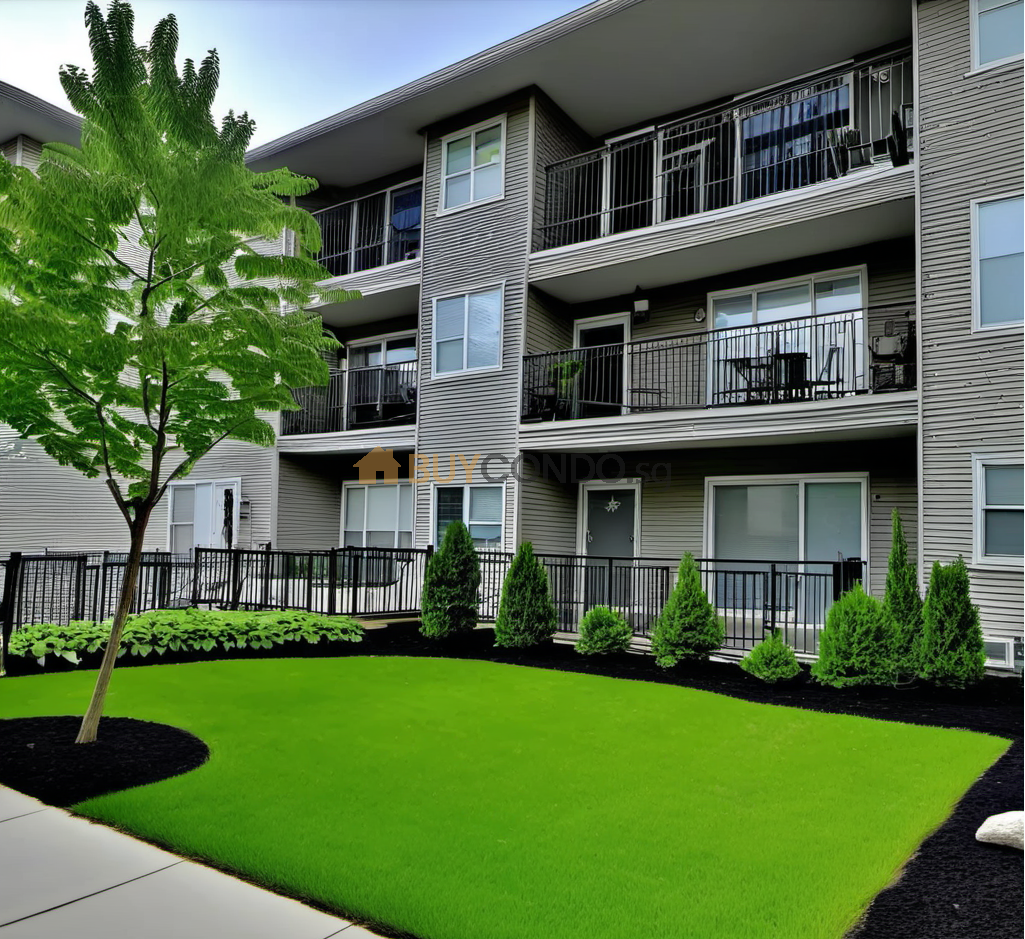
Key Takeaways:
- Implement value-adding improvements to your home to increase its appeal and asking price.
- Timing is key, so consider selling during seasons that are more favorable for buyers.
- Present your home in its best condition through staging and create competition with the right asking price.
- Use digital marketing tools to reach a wider audience and generate more interest in your property.
- Understanding the local real estate market and its trends is crucial for a successful sale.
Staging Your Home for a Quick Sale
Staging your home is a crucial step in the selling process. By arranging and decorating your home to showcase its potential, you can make a lasting impression on potential buyers and increase the likelihood of a quick sale. Staged homes are known to attract buyers and sell faster compared to unstaged homes. The impact of staging on a buyer’s perception cannot be underestimated.
The Impact of Staging on Buyer’s Perception
When buyers walk into a staged home, they can see themselves living in the space. Staging creates an inviting and visually appealing environment that allows buyers to envision their own belongings and lifestyle fitting seamlessly into the home. This positive first impression can significantly influence a buyer’s perception and increase their emotional connection to the property.
Staged homes tend to highlight the potential of different areas, making them appear spacious, functional, and well-maintained. By creating a desirable atmosphere, staging can help buyers imagine themselves living in the home, which can lead to higher offers and a quicker sale.
Staging Essentials: Prioritizing Living Room and Kitchen
While staging the entire home is important, certain areas deserve special attention. The living room and kitchen are two spaces that often play a significant role in a buyer’s decision-making process. To make the best impression, these rooms should be clean, decluttered, and decorated in a way that appeals to potential buyers.
In the living room, focus on creating a cozy and welcoming atmosphere. Arrange furniture to maximize space and flow, add tasteful decorations, and use lighting strategically to create an inviting ambiance. In the kitchen, highlight its functionality and cleanliness. Clear the countertops of unnecessary items, organize cabinets and drawers, and consider adding fresh flowers or a bowl of fruit to add a touch of vibrancy.
Staging Costs vs. Return on Investment
While staging may require some upfront investment, it is often considered a worthwhile expense with a high return on investment. According to the National Association of Realtors, staged homes sell faster and for a higher price compared to non-staged homes. The cost of staging can vary depending on factors such as the size of the home and the extent of the staging required.
Professional staging services are available for those who prefer a hands-off approach, but the costs can add up. Alternatively, sellers can opt for DIY staging with guidance from real estate agents or staging professionals. With some careful planning and creativity, sellers can transform their homes into appealing and welcoming spaces without breaking the bank.
Staging your home is a powerful tool in the selling process. By creating an atmosphere that appeals to buyers and showcases the home’s potential, you can significantly increase your chances of selling a staged home quickly and at a higher price.
Targeting the Ideal Buyer
Different types of properties attract different types of buyers with varying preferences. As a savvy home seller, it’s important to understand your target buyer in order to tailor your marketing and home improvements to appeal to the right audience.
For instance, if you have a move-in ready home, your ideal buyer might be someone looking for convenience and a ready-to-live-in space. On the other hand, fixer-uppers may attract investors or cash buyers who are willing to put in the work to transform the property.
Researching the ideal buyer for your property can inform your decision-making process. It will guide you when it comes to making repairs or upgrades that resonate with potential buyers. By catering to buyer preferences, you increase the chances of selling to the right audience and maximizing your profitability.
Emphasizing Maintenance History for Buyer Confidence
Highlighting the maintenance history of your home is crucial for buyer confidence. When potential buyers have access to detailed records of regular maintenance, periodic inspections, and any repairs carried out, they are more likely to feel reassured about the property’s overall condition.
By emphasizing the proactive approach you’ve taken in maintaining your home, you are positioning it as a well-cared-for and trustworthy investment. This can give buyers peace of mind and increase their willingness to make a competitive offer.
Boosting Your Home’s Profile with Online Tools
In today’s digital age, it’s essential to leverage online tools to boost your home’s profile and increase its online presence. By utilizing platforms and websites such as www.buycondo.sg that cater specifically to home selling, you can reach a wider audience of potential buyers.
Maximize your home’s online presence by utilizing professional photography and virtual tours. These visual assets can create a lasting impression and generate more interest in your property. Additionally, by showcasing your home’s digital history, maintenance records, and other pertinent information on online platforms, you can attract more qualified buyers.
Remember, the more visible your home is online, the greater the chances of connecting with buyers who are actively searching for properties like yours. By optimizing your home’s profile using online tools, you can boost its visibility, increase buyer interest, and ultimately improve your chances of a successful sale.
Curb Appeal: Your Home’s First Impression
The exterior of your home plays a crucial role in capturing the attention of potential buyers. It’s the first thing they see, and as they say, first impressions matter. That’s why improving your home’s curb appeal is essential to attract more buyers and increase the chances of a quick sale.
There are simple enhancements you can make to improve your home’s exterior and create a lasting impression. Start by giving your home a fresh coat of paint to make it look clean and well-maintained. A new paint job can instantly transform the appearance of your home and make it more inviting.
Investing in landscaping is another effective way to improve curb appeal. Keep your lawn well-manicured and consider adding some colorful flowers and plants to create an attractive and vibrant look. Landscaping not only enhances the visual appeal but also shows that you’ve taken good care of your property.
Don’t forget about the details! Small updates like replacing your front door, updating house numbers, or pressure washing your driveway can make a big impact on the overall appearance of your home. These small changes can give your home a fresh and modern look, instantly attracting buyers.

By focusing on improving your home’s curb appeal, you can create a memorable first impression that will catch the eye of potential buyers. Remember, a well-maintained and visually appealing exterior sets the stage for what awaits inside your home. So, invest in improving your curb appeal and reap the rewards of attracting more buyers and achieving a quick sale.
Landscaping for Profit: A Wise Investment
When it comes to selling your home, don’t overlook the power of landscaping. A well-maintained and visually appealing outdoor space can significantly increase the value and appeal of your property. By investing in landscaping, you not only enhance the overall aesthetics of your home but also attract buyers who appreciate outdoor living. It’s a wise investment that can yield profitable returns.
Recommended Upgrades for Outdoor Spaces
If you want to go above and beyond in improving your outdoor spaces, consider some recommended upgrades. Adding a patio or deck can create additional living space, making your home more attractive to buyers. Outdoor kitchens, fire pits, and well-designed seating areas are also great options that can elevate the functionality and appeal of your outdoor spaces. These upgrades not only enhance your lifestyle but also increase the overall value of your home.
Smart Updates to Kitchens and Bathrooms
When it comes to selling a home, kitchens and bathrooms are the areas that potential buyers pay close attention to. These rooms can make or break a sale, so it’s important to prioritize smart updates that can significantly increase the value and appeal of your home.
If your kitchen or bathroom is outdated or showing signs of wear and tear, investing in renovations and updates is a wise choice. Here are some key areas to focus on:
- Countertops: Consider replacing old and worn-out countertops with durable and stylish materials like granite or quartz. This can give your kitchen or bathroom a fresh and modern look that buyers will appreciate.
- Cabinets: If your cabinets are outdated or in poor condition, consider refacing or replacing them. This can instantly transform the entire space and make it more appealing to potential buyers.
- Fixtures: Upgrading fixtures such as faucets, showerheads, and light fixtures can make a significant difference in the overall look and functionality of your kitchen or bathroom.
- Appliances: Adding new appliances to the kitchen, such as a sleek refrigerator or a state-of-the-art stove, can not only improve its functionality but also attract buyers who are looking for modern amenities.
- Plumbing and lighting: Consider upgrading the plumbing and lighting fixtures in your kitchen or bathroom. This can not only enhance their functionality but also give them a fresh and inviting appeal.
By making these smart updates, you can increase the value and desirability of your home, making it more attractive to potential buyers. Remember, a well-designed and updated kitchen or bathroom can be a major selling point that sets your home apart from the competition.
Minor Upgrades, Major Impact
When it comes to selling your home, it’s the small details that can make a big difference. By focusing on minor upgrades and changes, you can maximize your home’s appeal and increase its value without breaking the bank. Let’s explore two effective strategies: hardware refresh and decluttering.
Hardware Refresh: Small Details Matter
Have you ever noticed how changing a doorknob or cabinet pull can completely transform the look of a room? These small details may seem insignificant, but they can have a significant impact on your home’s overall aesthetic. Consider refreshing your hardware by replacing outdated or worn-out doorknobs, cabinet pulls, and drawer handles with stylish and modern options.
Decluttering: Simplify to Amplify
In order to make a strong impression on potential buyers, it’s essential to create a clean and spacious environment. Decluttering is a simple yet powerful way to achieve this. Start by removing personal items, unnecessary furniture, and clutter from your home. Organize spaces and simplify your decor to create a sense of openness and allow buyers to envision themselves living in the space.
By focusing on these minor upgrades and decluttering, you can maximize your home’s appeal and increase its value with minimal time and effort. Remember, sometimes it’s the smallest changes that make the biggest impact.
Pricing and Timing in the Market
The Importance of Pricing in the Market
Pricing your home correctly is crucial to attract buyers and maximize the sale price. It’s essential to understand market conditions and trends that can impact the value of your property. By pricing your home competitively, you can position it as an attractive option for potential buyers and generate interest in the market.
When setting the asking price, consider factors such as comparable sales in your area, the condition of your home, and current market demand. A well-priced home can create a sense of urgency among buyers, leading to multiple offers and potentially driving up the final sale price.
Working with a real estate agent who has a deep understanding of the local market is key. They have invaluable insights into current market conditions and can provide expert guidance on how to price your home effectively to maximize your sale price.

Maximizing Your Sale with the Right Real Estate Agent
Choosing the right real estate agent is crucial to help you navigate the selling process and maximize your sale price. A skilled agent who understands the local market can provide expertise and insights that will help you make informed decisions.
Look for a real estate agent who has a track record of success in your area and specializes in selling homes similar to yours. They should have a deep understanding of market conditions, pricing strategies, and effective marketing techniques.
A good real estate agent will provide a comprehensive marketing plan to attract potential buyers and maximize the exposure of your home. They will leverage their network and digital marketing tools to reach a wide audience and generate interest in your property.
Additionally, a skilled agent will handle negotiations on your behalf, ensuring that you receive the best possible offer. Their expertise and market knowledge can help you navigate complex negotiations and achieve a successful sale.
By working with the right real estate agent, you can optimize your selling experience and increase your chances of achieving the highest possible sale price for your home.
Conclusion : 7 Tips for Home Sellers to Gain More Profitability
In conclusion, selling a home for maximum profitability requires careful planning and execution. By implementing the tips and strategies mentioned throughout the article, sellers can increase their profits and sell their home quickly.
Staging the home, improving curb appeal, and targeting the ideal buyer are key steps in the selling process. Leverage on an exclusive online property platform to feature the nice condos can also help attract more buyers and generate interest in the property.
Additionally, setting the right asking price, understanding market timing, and working with a skilled real estate agent are crucial factors in maximizing profits. By following these tips and utilizing effective selling strategies, sellers can navigate the real estate market with confidence and unlock higher profitability.
FAQ
What are some tips for home sellers to gain more profitability?
Implementing these tips can help sellers maximize their profits and sell their home quickly.
How does staging impact a buyer’s perception of a home?
Staging creates a positive first impression and helps buyers envision themselves living in the home, increasing its appeal.
What are the essentials of staging a home?
When staging, prioritize the living room and kitchen, as these areas have a significant impact on buyers’ impressions of the home.
Are staging costs worth the investment?
Staging costs can vary, but they are generally a worthwhile investment with a high return on investment, attracting more buyers and commanding higher offers.
How can I target the ideal buyer for my home?
Understanding the preferences of your target buyer can help you tailor your marketing and home improvements to appeal to the right audience.
How can I improve my home’s curb appeal?
Simple enhancements like fresh paint, landscaping, and maintaining a well-manicured lawn can significantly improve curb appeal, attracting more buyers and increasing the chances of a quick sale.
What are some smart updates I can make to my kitchens and bathrooms?
Smart updates like replacing countertops, cabinets, fixtures, and adding new appliances can give these rooms a fresh and modern look, increasing their functionality and desirability.
Can minor upgrades have a significant impact on my home’s appeal?
Yes, refreshing small details like hardware and decluttering the space can have a major impact on the home’s appeal, making it more enticing to potential buyers and increasing its value.
How important is pricing and timing in the real estate market?
Pricing the home right is crucial to attract buyers and create competition, and understanding market conditions and trends can help determine the optimal time to list a home for sale.
What is the importance of working with the right real estate agent?
Working with a skilled real estate agent who understands the local market can make a significant difference in the selling process, helping sellers maximize their profits and navigate the real estate market effectively.
The post 7 Tips for Home Sellers to Gain More Profitability appeared first on Wing Tai Holdings Singapore.
]]>The post How to Determine When is a Good Time to Sell My Property appeared first on Wing Tai Holdings Singapore.
]]>
Hey there, fellow property owners! Thinking about selling your property, but not sure when is the best time to do so? Well, you’ve come to the right place. Determining the perfect timing to sell your property can make all the difference in maximizing your profits and ensuring a smooth selling process. So, let’s dive in and explore some key factors that can help you make an informed decision.
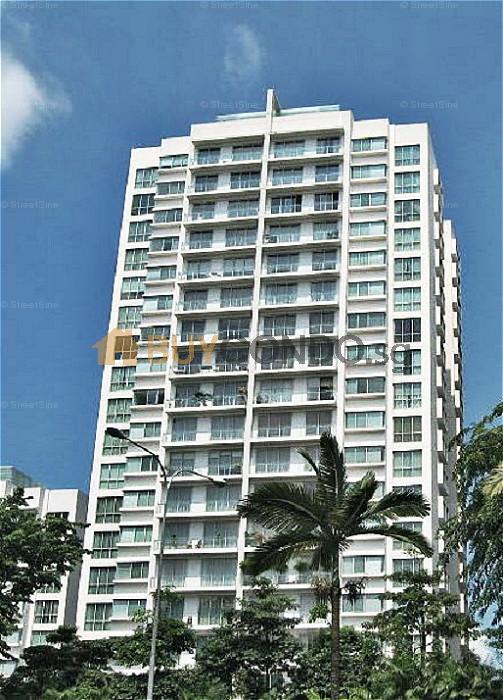
First things first, let’s talk about the current property market. Understanding the market trends, evaluating interest rates, and analyzing economic forecasts are essential in determining the opportune time to sell. By keeping a close eye on these factors, you can gain insights into the overall selling conditions and make a more informed decision.
Assessing the value of your property is another crucial aspect. Knowing the fair market value of your property through methods like appraisal and analyzing market comparables can help you price it competitively and attract potential buyers. And of course, we’ll also chat about the emotional side of selling your beloved property and how to navigate the journey.
All in all, my aim is to provide you with insights and strategies that can help you determine the best time to sell your property based on your specific circumstances. So, whether you’re a homeowner looking to upgrade or downsize or an investor capitalizing on market trends, let’s make the right move together!
Key Takeaways:
- Understanding the current property market trends is vital in determining the best time to sell.
- Assessing the value of your property through methods like appraisal and market comparables can help you price it competitively.
- Considering your personal financial goals and aligning them with market conditions is crucial in making an informed choice.
- Don’t forget to consider the emotional aspect of selling your property and prepare yourself for letting go.
- Observing property market trends and upcoming developments can provide insights into future predictions and help you make the right move.
Understanding the Current Property Market
Before making the decision to sell your property, it’s imperative to have a clear understanding of the current state of the property market. By evaluating market trends, analyzing interest rates and economic forecasts, and considering the impact of a seller’s versus buyer’s market, you can make informed decisions that align with your selling goals.
Evaluating Market Trends
One of the key factors in understanding the current property market is evaluating market trends. This involves closely monitoring price movements, supply and demand dynamics, and the overall sentiment of buyers and sellers. By gaining insights into these trends, you can assess the potential demand for your property and determine if it’s a favorable time to sell.
Analyzing Interest Rates and Economic Forecasts
In addition to market trends, analyzing interest rates and economic forecasts is crucial in understanding the current property market. Interest rates directly impact the affordability of mortgages, which in turn affects the demand for properties. Economic forecasts can provide insights into the stability and growth potential of the real estate market. By considering these factors, you can gauge the overall health of the market and make strategic selling decisions.
Impact of Seller’s versus Buyer’s Market
Whether it’s a seller’s market or a buyer’s market can significantly influence your selling strategy. In a seller’s market, where demand exceeds supply, you may have more negotiating power and the potential to secure higher offers. On the other hand, in a buyer’s market, where supply exceeds demand, you may need to be more competitive with pricing and marketing strategies to attract potential buyers. Understanding the current market conditions and adapting your approach accordingly can optimize the outcome of your property sale.
| Market Factors | Seller’s Market | Buyer’s Market |
|---|---|---|
| Supply and Demand | Low supply, high demand | High supply, low demand |
| Pricing | Potential for higher prices | Need to be competitive with pricing |
| Negotiating Power | More negotiating power for sellers | Buyers may have more negotiating power |
| Time on Market | Properties may sell more quickly | Properties may take longer to sell |
Understanding the current property market, evaluating market trends, analyzing interest rates and economic forecasts, and recognizing the impact of a seller’s versus buyer’s market are essential steps in determining the right time to sell your property. By staying informed and adapting your approach as needed, you can position yourself for success in maximizing your property’s value and achieving your selling goals.
Assessing Your Property’s Value
Before selling your property, it is crucial to assess its value accurately. Proper valuation ensures that you price your property competitively and attract potential buyers. There are various methods to determine the fair market value of your property, such as property appraisal and market comparables.
One common method is property appraisal, where a licensed appraiser evaluates your property’s characteristics, condition, and location to determine its value. Appraisals provide an expert assessment based on industry standards and can be used as a reliable estimate of your property’s worth.
To get a comprehensive understanding of your property’s value, you can also analyze market comparables. This involves researching recent sales data of comparable properties in your area. By comparing factors such as location, size, condition, and selling price of similar properties, you can gauge the market value of your property.
When conducting a property value assessment, it’s important to consider both objective and subjective factors. Objective factors include those that can be quantified, such as square footage, number of rooms, and recent sales data. Subjective factors, on the other hand, encompass elements like design, finishes, and the overall condition of the property. By considering these factors, you can arrive at a more accurate assessment of your property’s value.
Remember, property valuation methods provide a snapshot of the market, and the final selling price can be influenced by various factors, including buyer demand, negotiation skills, and market conditions. However, conducting a thorough property value assessment can give you a solid foundation for pricing your property competitively and maximizing your chances of a successful sale.

Selling in Peak Seasons: Timing Matters
When it comes to selling your property, timing can make a significant difference in the success of your sale. Selling during peak seasons, when demand is high, can lead to faster sales and potentially higher prices. Understanding historical data on high-demand periods can provide valuable insights into when buyer activity is at its peak, allowing you to strategically time your sale for maximum impact.
Historical Data on High-Demand Periods
By analyzing historical data, you can identify trends and patterns in the real estate market. This data reveals when buyer demand tends to be highest, giving you a clear advantage when deciding when to list your property. Whether it’s the spring when buyers are eager to move before the start of the school year or the holiday season when people may be searching for a new home, historical data can guide your timing decisions.
Benefits of Off-Season vs Peak-Season Selling
While selling during peak seasons can be advantageous, there are also benefits to off-season selling. During quieter periods, there may be less competition, allowing your property to stand out to potential buyers. Additionally, buyers who are searching during off-peak seasons may be more motivated, increasing the likelihood of a successful sale.
Ultimately, the decision to sell in a peak season or an off-season depends on various factors, including your timeline, market conditions, and personal circumstances. By carefully considering the timing of peak seasons and weighing the advantages of different selling periods, you can make an informed decision that aligns with your goals.
Seller’s Market Strategies: When Demand Is High
In a seller’s market, where demand for properties is high, it’s crucial to employ strategic tactics to maximize your profits and achieve a higher selling price. Here, I will explore various seller’s market strategies, including effective pricing techniques and negotiation tactics. By understanding how to leverage a seller’s market to your advantage, you can increase your chances of attracting competitive offers and achieve optimal results.
One of the most important aspects of selling in a seller’s market is setting the right price for your property. Pricing techniques can help you position your property competitively, attracting potential buyers while still ensuring a profitable sale. Consider using a comparative market analysis to evaluate recent sales of similar properties in your area. This will provide valuable insights into the current market value and allow you to price your property accordingly.
Furthermore, negotiation tactics play a crucial role in a seller’s market. As a seller, you have the upper hand, but it’s important to approach negotiations strategically. Start by setting your minimum acceptable price and be prepared to confidently negotiate to maximize your profits. Consider employing tactics such as highlighting the unique features and benefits of your property, emphasizing scarcity, and creating a sense of urgency among potential buyers.
Remember, in a seller’s market, demand is high, and buyers may be willing to make competitive offers. By showcasing the value of your property and utilizing effective negotiation tactics, you can increase your chances of achieving a higher selling price and maximizing your profits.
To illustrate these strategies, let’s take a look at the following table:
| Strategy | Description |
|---|---|
| Pricing Competitively | Setting the right price based on market comparables to attract potential buyers. |
| Emphasizing Unique Features | Highlighting the distinctive qualities of your property to differentiate it from others on the market. |
| Creating Urgency | Instilling a sense of urgency among potential buyers through limited-time offers or exclusive incentives. |
| Negotiating Confidently | Approaching negotiations with confidence, setting a minimum acceptable price, and leveraging your position as a seller. |
Property Upkeep and Investment Returns
Proper property maintenance is essential for maximizing its value and attracting potential buyers. By staying on top of property upkeep, you can ensure that your property remains in top condition, increasing its appeal and potential resale value.
Maintaining Property for Maximum Value
Regular maintenance tasks, such as landscaping, exterior repairs, and interior updates, are crucial for preserving your property’s value. By keeping your property well-maintained, you can create a positive first impression and make it more desirable to prospective buyers. Remember, a well-maintained property sends a strong message that it has been cared for and is worth investing in.
“A beautifully maintained property not only maximizes its value but also creates a lasting impression on potential buyers. It’s a reflection of the level of care and attention that has been given to the property over time.”
– Property Maintenance Expert
Aside from regular upkeep, consider investing in improvements that can enhance your property’s value. This may include upgrading outdated features, renovating key areas such as kitchens and bathrooms, or adding energy-efficient elements like solar panels. These improvements can attract buyers and potentially increase your return on investment when it comes time to sell.
Calculating Potential Profit from Property Improvements
When considering property improvements, it’s important to evaluate the potential return on investment (ROI) they can generate. Not all improvements will offer a significant increase in property value, so it’s crucial to prioritize those that will provide the best returns.
To calculate potential profit from property improvements, consider factors such as the cost of the improvement, the estimated increase in property value, and the local real estate market conditions. It’s advisable to consult with a real estate expert or a professional appraiser who can provide insights on the potential ROI for specific improvements in your area.
A sensible approach is to focus on improvements that address the most critical areas, such as updating the kitchen or improving curb appeal. These enhancements are more likely to attract buyers and lead to a higher sale price.
Remember, property improvements should be strategic and aligned with market trends and buyer preferences. By understanding the potential returns and making informed decisions, you can optimize the value of your property and increase your chances of a profitable resale.
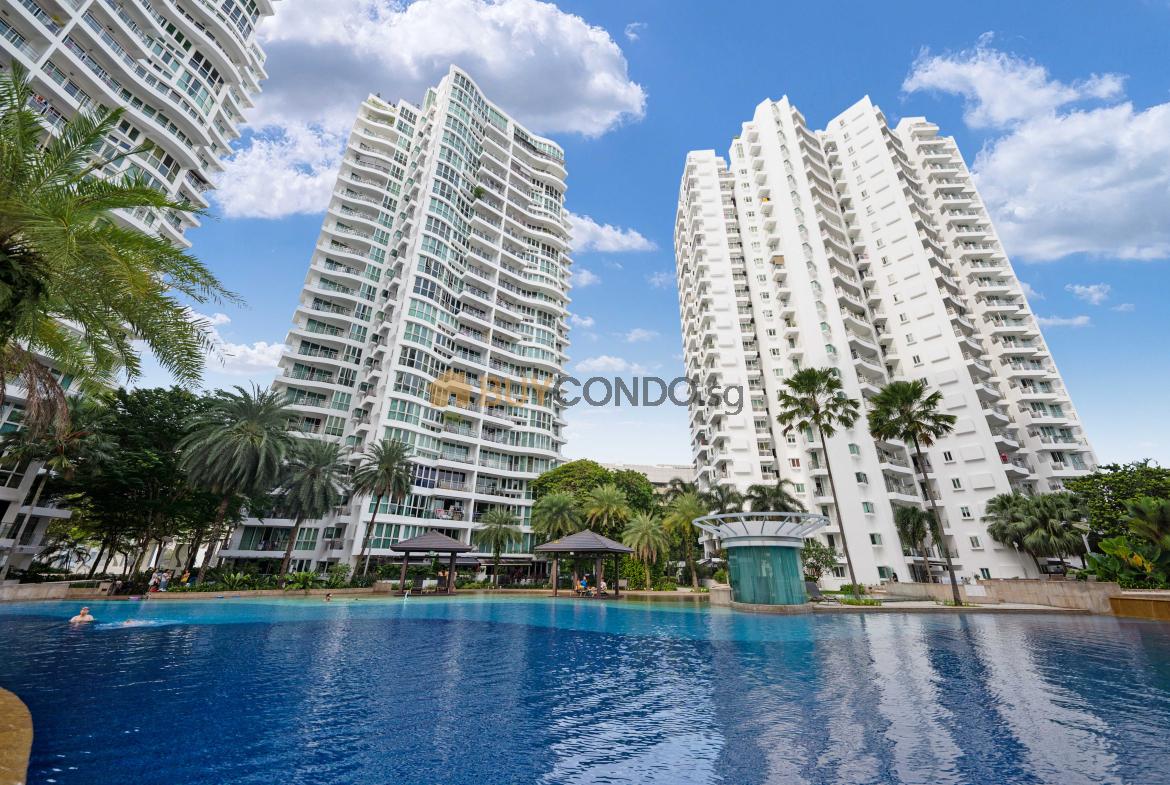
The Emotional Aspect of Selling Your Property
Selling a property is not only a financial transaction; it can also have emotional implications, especially if you have a sentimental attachment to the property. Letting go of a place filled with memories and personal experiences can evoke a mix of emotions, and it’s important to acknowledge and address these feelings during the selling process.
Preparation for Letting Go
Before putting your property on the market, take the time to prepare yourself emotionally for the transition. Reflect on the reasons behind your decision to sell and remind yourself of the goals you hope to achieve by letting go of the property. This will help you stay focused and motivated throughout the selling process.
Additionally, decluttering and depersonalizing the space can assist in detaching yourself emotionally. Pack away personal items, photographs, and mementos that may remind you of past experiences and create a neutral and welcoming environment for potential buyers.
Seeking emotional support from friends, family, or even professional counselors can also be beneficial during this period. Talking about your feelings and concerns can provide clarity and reassurance, helping you navigate the emotional journey of selling your property.
The Weight of Sentimentality in Sales Timing
Understanding the influence of sentimentality on sales timing is crucial. While it’s important to consider market conditions and financial goals, it’s equally important to find a balance between practicality and emotional readiness.
Take the time to evaluate your emotional attachment to the property and determine if you’re truly ready to let go. Rushing into a sale when you’re not emotionally prepared may lead to regrets or feelings of loss. On the other hand, waiting indefinitely due to sentimentality can hinder your ability to move forward and achieve your broader goals.
By acknowledging the emotional aspects of selling your property and finding a balance between practicality and sentimentality, you can navigate the process with confidence and make decisions that align with your overall goals.
“Selling a property is not just a transaction; it’s an emotional journey of letting go and embracing new possibilities.”
| Emotional Aspect of Selling Your Property | Preparation for Letting Go | The Weight of Sentimentality in Sales Timing |
|---|---|---|
| Involves acknowledging and addressing emotions | Declutter and depersonalize the space | Find a balance between practicality and emotional readiness |
| Reflect on reasons for selling and goals | Seek emotional support from friends and family | Evaluate emotional attachment and readiness to let go |
| Emphasize the importance of preparation | Talk about feelings and concerns | Achieve a balance between sentimentality and practicality |
Personal Financial Goals Alignment and Market Analysis
When it comes to selling your property, aligning your personal financial goals with market conditions is crucial. By understanding the current market analysis and utilizing real-time market data, you can make informed decisions about the timing of your property sale.
Personal Financial Goals Alignment
Before selling your property, it’s essential to assess your personal financial goals and how they align with your decision to sell. Consider factors such as your desired profit, investment strategy, and future financial plans. Are you looking to upgrade to a larger property, downsize, or invest in other ventures? Understanding your financial objectives will help you determine the right time to sell and ensure that your property sale supports your long-term financial goals.
Market Analysis and Real-Time Data Utilization
Market analysis plays a significant role in determining the ideal time to sell your property. Keeping a close eye on market trends, such as property prices, inventory levels, and buyer demand, can provide valuable insights into the current selling conditions. In addition, utilizing real-time market data, such as recent sales data and comparable property prices, can help you accurately assess the value of your property and set a competitive listing price.
By staying informed about market conditions and utilizing real-time data, you can strategically time your property sale to maximize your profits and achieve your personal financial goals.
Impact of Evolving Life Priorities
When it comes to deciding the best time to sell a property, evolving life priorities can have a profound impact. For instance, individuals may find themselves in a situation where they need to move closer to schools or workplaces due to changing family dynamics or career opportunities. The need to reduce commuting time and provide better educational opportunities for children can become a pressing factor in determining the urgency of selling a property.
Furthermore, evolving life priorities can also encompass lifestyle changes, such as the desire to upgrade to a larger home, downsize to a more manageable property, or relocate to a different neighborhood that better aligns with one’s current lifestyle. For example, a family may consider selling their current home to upgrade to a larger house to accommodate a growing family or to downsize to a more compact, low-maintenance property after children have moved out. These shifting priorities can significantly influence the decision to sell a property and underscore the importance of carefully evaluating the optimal timing for such a move.
Moreover, evolving life priorities can also be influenced by external factors, such as changes in employment, family dynamics, or educational opportunities. For example, a career advancement that requires relocation to a different city or country may prompt individuals to consider selling their property and moving to a new location. Similarly, changes in family dynamics, such as children leaving for college or elderly parents moving in, can also impact the decision to sell a property. By considering these evolving life priorities and their implications, individuals can make informed decisions about the right time to sell their property, ensuring that it aligns with their current and future lifestyle needs.
Addressing Depreciating Property Value
When it comes to addressing depreciating property value, sellers should be aware of the potential impact on their decision to sell. For instance, new properties may experience a dip in value due to supply surges, while aging properties may also face depreciation over time. It’s essential to understand how these factors can influence the timing of a property sale and the potential financial outcome.
For example, let’s consider a scenario where an individual owns a new property in an area that has experienced a surge in new developments. The increased supply of properties in the area could lead to a drop in the value of existing properties, including the one owned by the individual. In such a situation, the owner may need to evaluate whether waiting for a market correction or selling at the current value would be more beneficial in the long run. This decision would be influenced by various factors, including the owner’s financial goals, investment strategy, and the urgency of the sale.
It’s also important to consider the impact of aging properties on depreciation. Over time, older properties may experience a natural decrease in value due to wear and tear, changing neighborhood dynamics, or evolving market preferences. Sellers need to take into account these potential depreciation factors and assess whether the current market conditions align with their selling objectives. By carefully analyzing the impact of depreciating property values, sellers can make informed decisions about the optimal timing for selling their properties.
Moreover, the impact of depreciating property value on the decision to sell underscores the need for a comprehensive evaluation of market trends and individual financial goals. By recognizing the potential implications of property depreciation and considering the long-term financial outcomes, sellers can make well-informed decisions about the timing of their property sales, ensuring that it aligns with their investment objectives and market dynamics.
Lifestyle Changes and Property Selling
Lifestyle changes can be a significant catalyst for property sales. When our circumstances shift, so too does our housing needs and preferences. Whether you find yourself wanting to upsize, downsize, or relocate to a new area, lifestyle changes play a crucial role in influencing your decision to sell a property.
Understanding the impact of lifestyle changes on property sales is essential for making informed choices about timing and maximizing your selling potential. By considering your evolving needs and priorities, you can determine when is the right time to make a move.
Upsizing allows you to accommodate a growing family or enjoy a larger living space. It might be that you need additional bedrooms, a dedicated home office, or more room for recreational activities. Whatever the reason, selling your current property to upgrade to a bigger space can meet your changing requirements and enhance your overall quality of life.
On the other hand, downsizing can offer numerous benefits, especially if you are an empty-nester or looking to simplify your lifestyle. Smaller properties require less maintenance and can be more cost-effective, freeing up financial resources for other priorities. Downsizing can also allow you to live in a location that better suits your current needs and preferences.
Relocating to a new area for work, family, or personal reasons is another lifestyle change that often leads to property sales. Whether it’s moving to a different city or even a new country, selling your property can provide the necessary funds and flexibility to start a new chapter in your life.
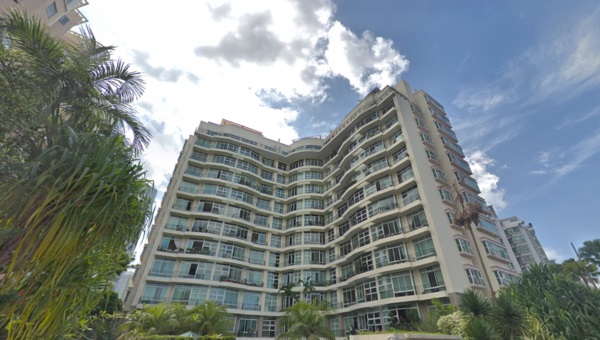
Ultimately, lifestyle changes offer opportunities for growth and transformation, and selling your property can be a practical step towards realizing your evolving aspirations. By assessing your current lifestyle, considering your future goals, and evaluating the market conditions, you can make well-informed decisions about when to sell your property to align with your changing lifestyle.
Observing Property Market Trends for Future Predictions
When it comes to selling your property, it’s essential to keep a close eye on property market trends. By observing these trends, you can gain valuable insights into future market predictions and make informed decisions about your property sale.
Gauging Upcoming Developments and Neighborhood Changes
One important aspect of observing property market trends is to gauge upcoming developments and neighborhood changes. This information can help you understand how the property market in your area is evolving and identify potential opportunities or challenges for your property sale.
To stay updated on upcoming developments, pay attention to local news and announcements from relevant authorities. Keep an eye out for new infrastructure projects, such as transportation improvements, commercial developments, or urban revitalization efforts. These developments can have a significant impact on property values and buyer demand.
Neighborhood changes can also influence the desirability of your property. Look for signs of gentrification, new amenities, or changes in demographics that may attract or deter potential buyers. Understanding these changes can help you position your property effectively in the market and attract the right audience.
Real Estate Cycles: When to Take Action
In addition to observing property market trends, understanding real estate cycles is crucial for timing your property sale. Real estate markets go through cycles of highs and lows, and being aware of these cycles can help you identify the right time to take action and sell your property.
Real estate cycles consist of four phases: expansion, peak, contraction, and trough. During the expansion phase, property prices and demand increase. It’s an ideal time to sell if you want to capitalize on rising prices. The peak phase is when the market reaches its highest point, and demand starts to cool off. It’s important to monitor market trends closely during this phase to determine if it’s still a favorable time to sell.
During the contraction phase, prices start to decline, and buyer demand decreases. Selling during this phase may not be ideal unless you have strong reasons, such as personal financial circumstances. The trough phase is the lowest point of the real estate cycle, and it’s usually a buyer’s market. It may not be the best time to sell unless you’re willing to accept lower offers.
By understanding these different phases of the real estate cycle, you can make better-informed decisions about when to list your property for sale. Timing your sale according to the market cycle can maximize your chances of achieving a favorable outcome.
Real Estate Market Cycle Phases
| Phase | Description |
|---|---|
| Expansion | Increasing property prices and demand |
| Peak | Highest point of the market; demand starts to cool off |
| Contraction | Declining prices and decreased buyer demand |
| Trough | Lowest point of the market; buyer’s market |
Observing property market trends and understanding real estate cycles are essential tools for making informed decisions about selling your property. By staying informed and monitoring the market closely, you can position yourself strategically and increase your chances of achieving a successful property sale.
Property Selling Indicators and Decision Making
When it comes to selling a property, there are numerous indicators that can inform your decision-making process. By analyzing market indicators, you can make informed choices that will help you navigate the selling process with confidence and achieve your desired outcomes.
One crucial property selling indicator to consider is the current market conditions. Understanding whether it is a buyer’s or seller’s market can significantly impact your selling strategy. In a seller’s market, where demand outweighs supply, you may have more flexibility in pricing and negotiation. Conversely, in a buyer’s market, where supply exceeds demand, you may need to be more strategic to attract potential buyers.
Additionally, analyzing market trends can provide valuable insights into the dynamics of the real estate market. Look for indicators such as price movements, average days on the market, and inventory levels to gauge market activity and assess the optimal time to sell your property.
Another important aspect of decision-making in property sales is understanding the financial aspects. Consider your personal financial goals and align them with the market conditions. Are you looking to maximize profits or sell quickly? Assessing your financial goals will help you determine the right time to sell and set appropriate pricing strategies.
Furthermore, conducting a thorough analysis of real-time market data can provide you with valuable information to support your decision-making process. Keep track of property prices in your area, follow economic forecasts, and stay informed about local developments that may impact the value of your property.
In conclusion, when selling a property, it is essential to analyze property selling indicators and make informed decisions based on market conditions, trends, and your own financial goals. By understanding these indicators and conducting thorough research, you can position yourself for success in the property market.
Conclusion – How to Determine When is a Good Time to Sell My Property
Summarizing Key Factors in Property Sales Timing
Making an Informed Choice for Your Unique Situation
When it comes to selling your property, timing is everything. Throughout this article, we have explored the key factors that influence the right time to sell your property. By considering market trends, personal financial goals, and lifestyle changes, you can make an informed choice that aligns with your unique situation.
Understanding the current property market is essential for determining the optimal timing of your sale. By evaluating market trends, analyzing interest rates and economic forecasts, and recognizing the impact of a seller’s versus a buyer’s market, you can better navigate the real estate landscape.
Assessing your property’s value is another crucial aspect. Conducting a thorough property appraisal, examining market comparables, and considering the potential return on investment from property improvements will help you price your property competitively and attract potential buyers.
Timing is also influenced by whether you choose to sell in peak seasons or off-seasons. Historical data on high-demand periods can guide your decision, and understanding the benefits of each selling period can help you strategically time your sale for optimal results.
It’s important to remember that in a seller’s market, implementing effective strategies such as pricing techniques and negotiation tactics can maximize your profits. Additionally, proper property upkeep and strategic renovations can enhance your property’s selling potential.
Furthermore, for leasehold properties, considering the expiration of the lease and renewal options is crucial. Selling your property due to lifestyle changes requires careful consideration, as does observing property market trends to predict future developments.
By considering all these factors and making an informed choice, you can achieve the best results when selling your property. Remember, every situation is unique, so it’s essential to understand your own circumstances and align them with the market conditions. With the right timing, you can confidently navigate the property selling process and achieve your desired outcomes.
FAQ
How can I determine when is a good time to sell my property?
There are several factors to consider when determining the right time to sell your property, including understanding the current property market, assessing the value of your property, and aligning your personal financial goals with market conditions.
How do I understand the current property market?
To understand the current property market, you need to evaluate market trends, such as price movements and supply and demand dynamics. Additionally, analyzing interest rates and economic forecasts can provide insights into the stability and growth potential of the real estate market.
How do I assess the value of my property?
You can assess the value of your property by utilizing methods such as property appraisal and market comparables. Factors to consider include location, size, condition, and recent sales data of comparable properties in the area.
Does timing matter when selling property?
Yes, timing can significantly impact the selling process. Selling during peak seasons, understanding historical data on high-demand periods, and weighing the benefits of off-season versus peak-season selling are crucial when determining the timing of your property sale.
What strategies can I use in a seller’s market?
In a seller’s market, you can implement effective strategies such as pricing techniques and negotiation tactics to maximize profits from your property sale.
How important is property upkeep when selling?
Proper property upkeep is essential to maintain its value and appeal to potential buyers. By maintaining your property and considering strategic renovations, you can enhance its selling potential and maximize its value.
When should I sell leasehold properties?
Selling leasehold properties requires considering factors such as lease expiration and renewal options. Understanding the implications of leasehold properties can help you make an informed decision on when to sell and maximize your returns on investment.
How do emotions play a role in selling property?
Selling a property can be an emotional process, especially if you have a sentimental attachment to it. Understanding the weight of sentimentality in sales timing and preparing yourself to let go can help you navigate the emotional journey and make decisions that align with your overall goals.
How do I align my personal financial goals with market conditions?
It’s crucial to align your personal financial goals with market conditions by considering real-time market data and analyzing how it relates to your financial objectives. This will help you make informed decisions about the timing of your property sale.
How can lifestyle changes influence my decision to sell a property?
Lifestyle changes such as upsizing, downsizing, or relocating can influence your decision to sell a property. Considering the impact of lifestyle changes on property sales can help you determine the right time to make a move.
What should I observe to predict future property market trends?
Observing property market trends can provide insights into upcoming developments and neighborhood changes, helping you make informed decisions about property sales. Additionally, understanding real estate cycles can help you identify the right time to take action and sell your property.
What are some indicators to guide property selling decisions?
Key property selling indicators include factors such as market trends, interest rates, economic forecasts, and supply and demand dynamics. Analyzing these indicators can help you make informed decisions about property sales and navigate the selling process with confidence.
The post How to Determine When is a Good Time to Sell My Property appeared first on Wing Tai Holdings Singapore.
]]>The post Resolving Water Leakage Issues in Condos appeared first on Wing Tai Holdings Singapore.
]]>Resolving Water Leakage Issues in Condos, An in-depth look at the causes, signs, consequences, prevention, and resolution of water leakage into condos from exterior walls, highlighting the importance of professional help, regular maintenance, and legal support.

Understanding the Common Causes of Water Leakage
Water leakage into condos from exterior walls can be caused by various factors, with old buildings presenting specific vulnerabilities. For instance, water seeping through the floor slab in older constructions can lead to leakage issues, highlighting the impact of aging infrastructure on water infiltration. Additionally, common causes of water leakage include poor construction practices, the use of substandard building materials, temperature fluctuations, and prolonged water exposure. These factors can collectively contribute to the compromised integrity of the building envelope, making it susceptible to water intrusion and subsequent leakage issues.
Moreover, exterior wall leakage can result in serious aesthetic and structural damage to homes. For example, poor construction practices and the use of inferior building materials can compromise the building’s ability to withstand water infiltration, leading to various issues such as cracks, peeling or bubbling walls, discoloration, and mold growth. This can significantly impact the overall condition and appeal of the property, necessitating prompt intervention to address the root causes of water leakage and prevent further damage.
Furthermore, the impact of water leakage from exterior walls can extend beyond the visible signs of damage. It can compromise the structural integrity of the building, potentially leading to costly repairs and safety concerns for the occupants. Understanding these common causes of water leakage is crucial for implementing proactive measures to prevent and address such issues effectively.
For example, a condo owner shared their experience of water leakage from exterior walls, resulting in mold and rot issues in their unit. This instance underscores the significance of recognizing the common causes of water leakage and the need for proactive measures to safeguard the condo from such vulnerabilities.
Recognizing the Signs of Water Leakage
Recognizing the signs of water leakage is essential for early intervention and prevention of further damage. Signs of water leakage include visible indications such as cracks, peeling or bubbling walls, discoloration, yellowish stains, and mold growth. These visible signs can serve as early warnings of potential water intrusion and leakage issues within the condo.
In addition to visible signs, other indicators such as a musty odor or dampness in the affected areas can further signify the presence of water leakage. By being vigilant and observant of these signs, condo owners can promptly address water leakage issues, preventing extensive damage and subsequent repair costs. Therefore, recognizing the signs of water leakage is critical for preserving the integrity and habitability of the condo.
Moreover, the impact of water damage from upper units can sometimes take time to manifest, emphasizing the importance of early detection and resolution of leakage issues. This delayed impact underscores the significance of conducting thorough inspections and promptly addressing any signs of water intrusion to prevent further damage.
For instance, a condo owner in the Katong, Joo Chiat area, shared their experience of discovering water leakage from the exterior walls, leading to mold and rot issues in their unit. This example highlights the practical implications of recognizing the signs of water leakage and the need for proactive measures to address such issues effectively.
Consequences of Water Leakage
The consequences of water leakage into condos from exterior walls can be far-reaching, affecting both the structural integrity and aesthetic appeal of the property. Water leakage can result in significant damage to the condo, compromising its overall condition and value. For example, prolonged water leakage can lead to structural deterioration, necessitating extensive repairs and potentially compromising the safety of the residents.
Furthermore, water damage from upper units can take time to show, underscoring the potential challenges associated with identifying and addressing water leakage issues in a timely manner. This delayed impact emphasizes the urgency of proactive measures to prevent and resolve water leakage from exterior walls.
In addition to structural damage, exterior wall leakage can also lead to aesthetic issues such as peeling walls, stains, and mold growth, significantly diminishing the appeal and value of the property. These consequences highlight the urgency of promptly addressing water leakage to prevent further damage and protect the condo’s overall condition.
Moreover, the presence of mold growth resulting from water leakage can pose health risks to the occupants. Mold spores can exacerbate respiratory conditions and allergies, underlining the critical importance of addressing water leakage promptly to safeguard the well-being of the residents. Therefore, understanding the consequences of water leakage underscores the significance of proactive measures to prevent and address such issues effectively.
For instance, a user named jpcannon posted on a forum about water leakage in their condo unit from exterior walls, leading to mold and rot issues. This real-life example illustrates the potential consequences of water leakage and the imperative need for proactive measures to mitigate such issues effectively.
Deciphering Responsibility for Water Leakage
Determining responsibility for water leakage in condos is crucial for initiating necessary repairs and maintenance. Generally, liability for damage caused by water leakage is attributed to the upper unit, meaning that the owner of the upper floor unit is usually responsible for the resulting damage. However, the responsibility for repairs may vary depending on the specific circumstances and the governing regulations in place.
During the Defects Liability Period (DLP), developers or the Management Corporation Strata Title (MCST) are responsible for addressing such issues, particularly related to waterproofing. This period is significant as it offers a window during which the developer is expected to rectify any defects in the construction, including waterproofing issues that may lead to water leakage from exterior walls.
In Singapore, the Building Maintenance and Strata Management Act governs water leakage disputes, providing guidelines for determining responsibility, conducting investigations, and seeking mediation or legal recourse if disputes arise. This legislation sets clear expectations for both the owners of the affected units and the management authorities, ensuring a structured approach to resolving water leakage issues in condominiums.
Furthermore, in cases of inter-floor leaks, both parties involved must jointly carry out an investigation to determine the cause and proceed with repair works, as outlined by the Act. This collaborative approach underscores the significance of shared responsibility and cooperative efforts in addressing water leakage issues effectively.
The Process of Testing for Water Leakage
The process of testing for water leakage in condos requires a comprehensive approach to identify the root cause and extent of the issue, especially in inter-floor leak scenarios. This process involves a meticulous examination of the affected areas, potentially involving the use of specialized equipment to detect moisture and water infiltration accurately.
In addition to visual inspections, sophisticated techniques such as thermal imaging and moisture meters can be employed to pinpoint the exact source of the leakage and assess its impact on the condo’s structure. These advanced testing methods provide valuable insights into the extent of the water leakage, enabling targeted and effective repairs to be conducted.
Moreover, engaging professional specialists to handle water leakage testing and repairs is essential due to the complex nature of these issues. Their expertise ensures that the investigation is thorough and methodical, facilitating the identification of the underlying causes of water leakage and the subsequent implementation of appropriate solutions.
Furthermore, joint investigations between the parties involved are crucial to collaboratively establish the cause and scope of the water leakage, which is particularly pertinent in situations where upper units are implicated in the damage. By engaging in a collective effort to identify the source of the leakage, condo owners can ensure that repairs are targeted and effective, subsequently preventing further damage and minimizing repair costs in the long run.
For instance, a specific case highlighted the significance of engaging professional specialists to handle water leakage testing and repairs effectively, underscoring the complexities involved in investigating and addressing such issues.
Prevention of Water Leakage
Implementing proactive measures to prevent water leakage into condos from exterior walls is vital in averting potential damage and subsequent repair costs. By addressing vulnerabilities in the building envelope, such as cracks or compromised sealants, condo owners can mitigate the risk of water intrusion and its associated consequences.
In addition to addressing existing vulnerabilities, regular inspections and maintenance play a crucial role in preventing water leakage. Inspections allow for the early detection of potential issues, such as deteriorating sealants or cracks in the exterior walls, enabling prompt repairs before extensive damage occurs. Scheduled maintenance, including resealing exterior joints and addressing any structural issues, can significantly reduce the likelihood of water leakage.
Water leakage in their condo unit from exterior walls leads to mold and rot issues. This instance highlights the practical implications of implementing proactive measures to prevent water leakage and the imperative need for regular inspections and maintenance to safeguard the condo from such vulnerabilities.
Moreover, the application of advanced waterproofing solutions can provide enhanced protection against water leakage. Modern sealants and protective coatings offer improved resistance to water penetration, bolstering the condo’s defenses against exterior wall leakage. Engaging professional waterproofing specialists can provide access to cutting-edge solutions tailored to the specific needs of the condo, further fortifying its ability to withstand water infiltration.
In conclusion, a proactive approach to prevention through regular inspections, maintenance, and the application of advanced waterproofing solutions is essential in safeguarding condos from water leakage. By taking these measures, condo owners can minimize the risk of structural and aesthetic damage, ensuring the longevity and integrity of their properties.
Role of Maintenance and Inspections
Conducting regular maintenance and inspections is crucial for identifying potential water leakage issues before they escalate. It allows for the early detection of any signs of water leakage such as cracks, peeling or bubbling walls, discoloration, and mold growth, which can help in preventing further damage to the condo. For instance, if a maintenance inspection identifies cracks in the exterior walls, immediate action can be taken to address the problem, preventing potential water leakage issues from arising.
In addition, the Defects Liability Period for waterproofing is a critical consideration when dealing with water leakage concerns. It is essential for condo owners to be aware of this period, as it signifies the duration during which the developer or MCST is responsible for repairs, especially related to waterproofing issues. By conducting regular maintenance and inspections during this period, any potential water leakage problems can be identified and resolved promptly, mitigating the risk of extensive damage to the condo.
To ensure the effectiveness of maintenance and inspections, engaging the services of a professional specialist is advisable. Their expertise can provide a comprehensive assessment of the condo’s exterior walls, helping to detect any potential vulnerabilities and prevent water leakage issues. This proactive approach can ultimately save condo owners from the stress and financial burden associated with water damage repairs and dispute resolution.
Professional Help for Water Leakage Repairs
When it comes to addressing water leakage issues within condos, seeking professional help for repairs and waterproofing is crucial for an effective resolution. It’s essential to understand that water leakage problems in condos can be complex and require the expertise of professionals to ensure a thorough and lasting solution. For instance, engaging a reliable contractor with specialized knowledge in addressing external wall leakage can significantly contribute to resolving the issues and preventing recurrence. This emphasizes the importance of seeking out professionals who are well-versed in tackling the specific challenges associated with condo water leakage.
Moreover, it’s worth noting that there are various repair options available, each tailored to combat different types of water leakage problems. These options include traditional caulk application, strong sealant filling, and PU grouting. Each method has its own advantages and may be suitable for different scenarios, highlighting the need for professional guidance to determine the most effective approach for a specific water leakage issue. By enlisting the expertise of professionals, condo owners can have the assurance that the repairs will be carried out with precision and adherence to industry standards, ultimately leading to a sustainable solution.
In essence, the role of professionals in addressing water leakage repairs goes beyond mere technical expertise. It also encompasses providing valuable guidance, ensuring the use of appropriate repair methods, and safeguarding the long-term integrity of the condo. Therefore, it’s imperative for condo owners to recognize the value of professional assistance in mitigating water leakage issues and restoring the structural integrity of their properties.
Handling Disputes Over Water Leakage
Disputes over water leakage can lead to stress and tension between neighbors, underscoring the importance of seeking amicable resolution. In a particular case discussed in a forum, a user shared their experience of water leakage from exterior walls, resulting in a dispute over who was responsible for fixing the external wall cracks and internal wall plastering. Such disputes can significantly strain relationships between neighbors and affect the overall living environment in the condominium.
For example, a user shared information about compensation for water leakage, stating that the developer or MCST will be responsible for repairs in a forum discussion. This example underscores the practical implications of handling disputes over water leakage and the significance of seeking authoritative mediation to achieve a fair resolution.
Furthermore, the Strata Titles Board (STB) can mediate and make enforceable decisions in water leakage disputes, providing a route for resolution. For instance, if the matter cannot be resolved amicably, condo owners can make an application to the STB for mediation, and the board has the power to mediate between parties and make final decisions that are enforceable. Seeking mediation through authorized channels can help in addressing disputes effectively and maintaining harmonious relationships within the condo community. It’s essential to recognize the role of professional mediation in resolving disputes related to water leakage, promoting a peaceful and cooperative living environment for all residents.
In addition, the Strata Titles Board has the authority to issue orders that are enforceable by State Courts, ensuring that decisions made through the mediation process are binding and legally upheld. This mechanism provides a structured and authoritative approach to resolving water leakage disputes, offering condo owners a reliable avenue for seeking resolution and clarity in such matters.
Legal Support for Water Leakage Disputes
When disputes over water leakage arise in condo buildings, understanding the legal aspects and seeking appropriate legal support is essential for resolution. The Building Maintenance and Strata Management Act governs private non-landed estates in Singapore, outlining the responsibilities and liabilities related to water leakage issues. In cases where disputes cannot be resolved amicably, condo owners have the option to make an application to the Strata Titles Board for mediation.
For example, if there is uncertainty about the responsible party for water leakage, legal advice can help in deciphering the intricacies of the law and the specific circumstances of the situation. A law firm experienced in handling disputes can provide condo owners with the necessary guidance and representation throughout the mediation process, ensuring that their rights are protected and that a fair resolution is reached.
In Conclusion – Resolving Water Leakage Issues in Condos
understanding, preventing, and addressing water leakage in condos is essential for preserving the integrity of the property and fostering a conducive living environment. Professional help, regular maintenance, and legal advice play instrumental roles in managing and resolving water leakage issues. For example, regular maintenance can help identify potential water leakage issues before they escalate, allowing for timely intervention to prevent extensive damage. Additionally, professional specialists are equipped to handle the complex process of water leakage repairs, ensuring that the underlying causes are effectively addressed to prevent recurrence.
Condo owners are encouraged to explore Legal Advice’s resources for further insights and assistance in addressing water leakage concerns. In the event of water leakage, empowering them to make informed decisions and take appropriate action. With a comprehensive understanding of the legal framework and practical solutions for water leakage disputes, condo owners can navigate the challenges associated with water leakage effectively and protect their property investment. To explore these resources, visit Singapore Legal Advice’s website at https://singaporelegaladvice.com/law-articles/housing/tenancy-disputes for more details.
The post Resolving Water Leakage Issues in Condos appeared first on Wing Tai Holdings Singapore.
]]>The post ONE Pass in Singapore appeared first on Wing Tai Holdings Singapore.
]]>ONE Pass in Singapore, including its purpose, benefits, application process, eligibility criteria, successful collaborations, and comparisons to the Employment Pass, highlighting its role in elevating Singapores global workforce.

Overview of the ONE Pass in Singapore
The Overseas Networks & Expertise Pass (ONE Pass) is a highly sought-after 5-year renewable work pass designed for top talent across diverse professional fields, allowing them to work for multiple companies in Singapore without the need for employer sponsorship. This pass has been introduced as part of the Ministry of Manpower’s commitment to enhancing Singapore’s attractiveness to high-skilled individuals, and it is benchmarked to the top 5 percent of Employment Pass holders in Singapore.
For example, a multinational engineering firm leveraged the ONE Pass to attract a team of skilled engineers and technical experts from various countries. The streamlined processes and the flexibility of the pass allowed the company to seamlessly onboard these professionals, thereby enhancing its research and development capabilities. Moreover, the simplified administrative procedures facilitated a swift transition for the foreign employees, enabling them to focus on their work without the burden of extensive paperwork and bureaucratic processes.
Purpose and Function of the ONE Pass
The Overseas Networks & Expertise Pass (ONE Pass) in Singapore serves the pivotal function of enhancing the nation’s attractiveness to top talent by introducing a streamlined process for both employers and foreign employees. By simplifying administrative procedures, the ONE Pass effectively streamlines the processes for employers and foreign employees, doing away with the need for multiple passes and cards that were previously required for work in Singapore. This initiative also aligns with the Ministry of Manpower’s efforts to digitize and simplify processes for businesses and workers in Singapore, reflecting a commitment to modernization and efficiency in the workforce.
This functionality has greatly benefitted professionals and businesses alike. For instance, a renowned technology firm recently leveraged the ONE Pass to attract a team of accomplished data scientists and engineers from various parts of the world. The streamlined processes and the flexibility of the pass allowed the company to seamlessly onboard these experts, thereby bolstering its research and development capabilities. Moreover, the simplified administrative procedures facilitated a swift transition for the foreign employees, enabling them to focus on their work without the burden of extensive paperwork and bureaucratic processes.
In addition, the ONE Pass has significantly contributed to the nation’s efforts to attract global expertise and international networking, fostering an environment of collaboration and innovation within various industries in Singapore. This is evident in the success stories of companies and professionals who have harnessed the benefits of the ONE Pass to establish meaningful partnerships and drive impactful projects in the country.
Benefits of the ONE Pass
The ONE Pass, as a 5-year renewable work pass for top talent in various fields, offers a multitude of benefits that contribute to Singapore’s appeal as a global business hub. Apart from providing top-tier professionals with the flexibility to work for multiple companies without employer sponsorship, the pass also enhances security through biometric features. This not only ensures the safety of the pass holder but also contributes to the overall safety and security of the work environment in Singapore, promoting a conducive atmosphere for professionals and businesses alike.
Moreover, the ONE Pass streamlines processes for employers and foreign employees, replacing multiple passes and cards currently required for work in Singapore. This streamlined approach not only simplifies administrative processes but also increases efficiency in hiring and managing foreign employees. Employers have access to an online portal to manage their employees’ passes, which is part of the Ministry of Manpower’s efforts to digitize and simplify processes for businesses and workers in Singapore. This modern approach facilitates the seamless integration of top talent into the Singaporean workforce, promoting a collaborative and productive environment for both employers and employees.
Furthermore, the ONE Pass contributes to the overall economic growth and development of Singapore by attracting global expertise and fostering international networking. This is evident in the numerous success stories of professionals and organizations that have utilized the ONE Pass to establish impactful collaborations and drive innovation within the country.
To explore the full range of benefits and understand the eligibility criteria for the ONE Pass, visit the Ministry of Manpower’s website at Ministry of Manpower for more details.
 Applying for the ONE Pass
Applying for the ONE Pass
The application process for the ONE Pass is designed to be thorough and comprehensive, ensuring that only highly skilled and qualified individuals can obtain this prestigious work pass. The process involves several steps to evaluate the eligibility and suitability of the applicants, contributing to the enhancement of Singapore’s global talent pool.
To begin the application process, individuals interested in the ONE Pass need to prepare and submit essential documents, including but not limited to educational certificates, professional qualifications, and employment records. The submission of these documents allows the authorities to assess the applicant’s qualifications, experience, and expertise in their respective fields, ensuring that they meet the stringent criteria set for the pass.
Once the initial documentation is submitted, applicants are required to complete a detailed application form, providing comprehensive information about their professional background, employment history, and intended scope of work in Singapore. Additionally, applicants may need to furnish a detailed employment proposal outlining their role and responsibilities, as well as the potential contributions they aim to make to the Singaporean economy and society. This step helps the authorities gauge the value and impact that the applicant could bring to the country, reflecting the purpose of the ONE Pass in attracting top talent.
Furthermore, the application process for the ONE Pass may involve interviews or additional assessments to further evaluate the candidate’s expertise, experience, and potential impact on Singapore’s economy and society. This rigorous approach ensures that the ONE Pass is awarded to individuals who not only meet the minimum requirements but also possess exceptional skills and expertise that can contribute significantly to the country’s growth and development.
Moreover, the ONE Pass application process plays a crucial role in promoting international networking and collaboration, as it serves as a gateway for top talent to bring their expertise to Singapore and engage in impactful projects and partnerships.
For individuals interested in exploring the ONE Pass application process further, the Ministry of Manpower’s website provides comprehensive information and guidance on the required documentation, procedures, and relevant resources.
Eligibility Criteria for the ONE Pass
The eligibility criteria for the Overseas Networks & Expertise Pass (ONE Pass) in Singapore are designed to attract top talent in various fields. To qualify for the ONE Pass, individuals must meet specific requirements. Firstly, it is essential to earn a fixed monthly salary of at least S$30,000 for the last 12 consecutive months. This salary benchmark is set to ensure that the pass is targeted at high-skilled and experienced professionals who can contribute significantly to the Singaporean workforce.
Additionally, individuals can also qualify for the ONE Pass by being employed by an established company in Singapore. The definition of an established company is determined by specific financial metrics, including market capitalization or annual revenue. This criterion is put in place to ensure that individuals working for reputable and financially robust organizations are also considered for the ONE Pass.
Furthermore, the eligibility for the ONE Pass extends beyond financial considerations. Individuals who have demonstrated outstanding achievements in sports, arts, culture, academia, or research may also be eligible for the pass. This provision acknowledges the importance of expertise and talent in diverse fields, contributing to the enrichment and advancement of Singapore’s cultural and intellectual landscape. For instance, an accomplished academic researcher making significant contributions to a specialized field or an acclaimed artist elevating Singapore’s cultural identity could be eligible for the ONE Pass, recognizing their valuable expertise and potential contributions to the nation.
Moreover, the ONE Pass eligibility criteria play a significant role in attracting global talent and fostering international networking in Singapore, as it encourages individuals with diverse skills and expertise to consider the country as a hub for impactful professional opportunities and collaborations.
In conclusion, the eligibility criteria for the ONE Pass in Singapore are comprehensive, encompassing financial benchmarks, professional expertise, and contributions to various domains. These criteria aim to attract exceptional talent from around the world, enriching Singapore’s workforce and fostering a vibrant environment for innovation and growth. For more details on the ONE Pass eligibility and application process, visit the Ministry of Manpower’s website at Ministry of Manpower for comprehensive information and guidance.
Successful Collaborations and Partnerships through the ONE Pass
Real-life examples of successful collaborations and partnerships facilitated through the ONE Pass serve as a testament to the effectiveness of this program. These collaborations highlight how the ONE Pass has been instrumental in fostering global expertise and international networking within Singapore.
For instance, a renowned biotechnology firm based in the United States leveraged the ONE Pass to establish its regional headquarters in Singapore. This move not only brought cutting-edge research and development capabilities to the country but also created numerous high-skilled job opportunities for local talent. Additionally, the company’s collaboration with local universities and research institutions has contributed to knowledge transfer and the development of innovative solutions in the biotech sector. These achievements underscore the ONE Pass’s role in attracting top-tier organizations and fostering meaningful collaborations for the advancement of various industries in Singapore.
Furthermore, a prominent multinational technology company utilized the ONE Pass to bring together a diverse team of experts from around the world to drive digital transformation initiatives in Singapore. By leveraging the unique flexibility of the ONE Pass, the company was able to seamlessly integrate global talent into its local operations, leading to the successful launch of innovative products and services tailored to the Southeast Asian market. This collaboration demonstrates how the ONE Pass facilitates the cross-pollination of ideas and expertise, ultimately contributing to the expansion and diversification of Singapore’s knowledge-based economy.
Moreover, the successful collaborations and partnerships facilitated through the ONE Pass play a crucial role in promoting Singapore as a global hub for innovation and expertise, as they showcase the country’s ability to attract and support impactful projects and international collaborations.
Comparison: Employment Pass vs. ONE Pass
The Employment Pass and the ONE Pass are both important work passes in Singapore, each with its own unique features and benefits. The Employment Pass is designed for foreign professionals, managers, and executives who wish to work in Singapore, while the ONE Pass is specifically tailored for top talent in various fields, allowing them to work for multiple companies without employer sponsorship.
One of the major differences between the two passes is the salary threshold. While the Employment Pass has its own set of salary criteria, the ONE Pass’s salary requirement is benchmarked to the top 5 percent of Employment Pass holders in Singapore, thus making it more exclusive in terms of the financial eligibility. This distinction ensures that the ONE Pass is targeted at individuals with exceptional skills and expertise, contributing to the overall enhancement of Singapore’s global workforce.
Additionally, the renewal criteria for the Employment Pass and the ONE Pass differ significantly. While the Employment Pass renewal is based on specific employment conditions, the ONE Pass offers a more flexible renewal process, which includes earning a fixed monthly salary of at least SGD 30,000 on average over the past 5 years in Singapore or starting and operating a Singapore-based company employing at least 5 locals with a fixed monthly salary of at least SGD 5,000. This renewal criterion reflects the intention of the ONE Pass to attract and retain long-term top talent in Singapore, contributing to the country’s economic growth and development.
Furthermore, the distinct features of the Employment Pass and the ONE Pass cater to different segments of the workforce, providing individuals with diverse career opportunities and pathways in Singapore. This ensures that professionals with varying expertise and career goals can find suitable work pass options that align with their qualifications and aspirations.
Understanding the differences between the Employment Pass and the ONE Pass is crucial for individuals considering working in Singapore. It allows them to make an informed decision based on their qualifications, professional goals, and the specific benefits each pass offers. To explore the various work pass options in Singapore further, individuals can visit the Ministry of Manpower’s website for comprehensive details and guidance [Customer Product Context].
Renewal Process for the ONE Pass
The renewal process for the Overseas Networks & Expertise Pass (ONE Pass) in Singapore is designed to ensure that top talent continues to contribute to the nation’s growth and development. To be eligible for renewal, ONE Pass holders must meet specific criteria, including maintaining a fixed monthly salary of at least S$30,000 on average over the past 5 years in Singapore. This requirement underscores Singapore’s commitment to attracting and retaining high-caliber professionals who significantly contribute to the country’s economy and innovation landscape.
For instance, consider a successful finance executive who has been working in Singapore under the ONE Pass for the past five years. Throughout this period, the executive has consistently earned a fixed monthly salary of S$35,000, demonstrating the individual’s invaluable expertise and contribution to the financial sector in Singapore. This example illustrates how ONE Pass holders can meet the salary requirement for renewal, showcasing the pass’s role in maintaining a talented and high-earning workforce.
Moreover, ONE Pass holders are also eligible for renewal by starting and operating a Singapore-based company that employs at least 5 locals with a fixed monthly salary of at least S$5,000. This provision aligns with Singapore’s strategic focus on entrepreneurial innovation and job creation, allowing ONE Pass holders to transition into entrepreneurial endeavors and contribute to the local workforce. This aspect of the renewal process highlights the pass’s flexibility and support for diverse career pathways, emphasizing Singapore’s commitment to nurturing entrepreneurial talent within its borders.
Additionally, the renewal process for the ONE Pass reflects the country’s commitment to fostering a vibrant and competitive environment that thrives on the contributions of exceptional individuals. By providing a clear and structured pathway for renewal, the ONE Pass ensures the continuity of high-skilled talent in Singapore, ultimately contributing to the country’s sustainable economic growth and development.
To learn more about the renewal process and eligibility criteria for the ONE Pass, individuals can explore the Ministry of Manpower’s website for detailed information and guidance on sustaining their eligibility for this prestigious work pass.
Family Members and the ONE Pass
Family members of ONE Pass holders are eligible to join them in Singapore. This includes the pass holder’s spouse and children under the age of 21. Additionally, unmarried children above the age of 21 who have disabilities may also be considered for the Dependant’s Pass, allowing them to join the pass holder in Singapore.
For example, an accomplished professional who has been granted the ONE Pass may want to relocate to Singapore with their spouse and two young children. The entire family would be eligible to move to Singapore, and the pass holder’s children could attend schools in Singapore while the spouse may also have the option to work in the country under the Dependant’s Pass.
To bring family members to Singapore, the pass holder must submit an application for each family member along with the required supporting documents. The process may involve obtaining medical insurance for the family members and providing evidence of the pass holder’s ability to financially support their dependents while residing in Singapore. This ensures that the relocation process for the pass holder and their family members is seamless and in accordance with the guidelines set by the Ministry of Manpower.
Moreover, the inclusion of family members under the ONE Pass scheme reflects Singapore’s commitment to fostering an inclusive and supportive environment for top talent, ensuring that their relocation to the country is smooth and facilitates their seamless integration into the local community.
Conclusion: ONE Pass In Singapore
The ONE Pass is a significant addition to Singapore’s work pass landscape, designed to attract and retain top talent from around the world. By offering a 5-year renewable work pass for high-skilled individuals in various fields, the ONE Pass provides opportunities for these individuals to work for multiple companies in Singapore without the need for employer sponsorship. This not only benefits the individuals by providing them with greater flexibility and career opportunities, but it also enriches the local workforce by bringing in diverse expertise and knowledge.
For example, an accomplished researcher in the field of artificial intelligence can now collaborate with multiple organizations on cutting-edge projects, contributing to Singapore’s position as a global tech hub. This kind of collaboration not only elevates the local research and development efforts but also fosters international partnerships, driving innovation and economic growth in Singapore.
Moreover, the ONE Pass aligns with the Ministry of Manpower’s broader efforts to digitize and simplify processes for businesses and workers in Singapore. This commitment to modernizing the work pass system not only enhances the experience for foreign employees and employers but also demonstrates Singapore’s dedication to embracing technological advancements and creating a progressive, future-ready work environment.
Individuals interested in exploring the ONE Pass further are encouraged to visit the Ministry of Manpower’s website, where they can find detailed information, application procedures, and relevant resources to guide them through the process. This will allow them to gain a comprehensive understanding of the benefits and eligibility criteria associated with the ONE Pass, empowering them to make informed decisions about their career and potential opportunities in Singapore.
The post ONE Pass in Singapore appeared first on Wing Tai Holdings Singapore.
]]>The post Using a Friend or Relative as Your Property Agent appeared first on Wing Tai Holdings Singapore.
]]>
For Myself I don’t have good experiences with working with my past experiences with my friends.
Case Study:
I remembered when I come into the industry in 2009, my friend supported me and decides to offer a HDB shophouse for their Retail Business.
However instead of putting a One Month Goodfaith Deposit, my friend suggested to place a $1 as good-faith deposit. It was rejected by the landlord during that, and he informed my friend that was not serious about it. Some arguments took place and no longer in talking terms. Given that the same scenario has happened now, I will know how to handle my friend. Experience does helps.
Key Takeaways:
- Using a friend as your property agent can provide a foundation of trust and emotional ease.
- However, there may be uncertain expertise and market knowledge to consider.
- It’s crucial to evaluate your friend’s professional competence and ability to maintain objectivity.
- Biases and potential conflicts may challenge personal relationships during the transaction.
- Understanding the scope of a property agent’s role is essential.
The Comfort of Trust in Real Estate Transactions
Establishing trust with a property agent is crucial when navigating the complex world of real estate. Trust forms the foundation of a successful buyer-agent relationship, providing the comfort and assurance needed to make informed decisions throughout the transaction. While working with a professional agent is a common choice, using a friend as your property agent can offer added benefits.
Establishing trust with a property agent
Trust is a vital component in any real estate transaction. When using a friend as your property agent, you already have an existing level of trust, which can set a strong foundation for the process. The established bond allows for open communication, honest discussions, and a mutual understanding of your preferences and goals. This trust can create a sense of security, ensuring your friend-agent has your best interests at heart.
The emotional ease of working with someone familiar
One advantage of using a friend as your property agent is the emotional ease that comes with working with someone you already know and are familiar with. Your friend-agent has insights into your personality, lifestyle, and what you’re looking for in a property. This familiarity can lead to better understanding and decision-making, streamlining the process and reducing stress. The emotional ease of working with a friend can make the real estate journey more enjoyable and comfortable.
| Benefits of Trust in Real Estate Transactions |
|---|
| Establishes a strong foundation for the buyer-agent relationship |
| Encourages open communication and honest discussions |
| Provides a sense of security and mutual understanding |
| Streamlines the real estate process and reduces stress |
Uncertain Expertise and Market Knowledge
While using a friend as your property agent may have its advantages, it’s important to consider the potential drawback of uncertain expertise and market knowledge. While your friend may be familiar with real estate, they may not possess the same level of expertise and market knowledge as a professional agent. This could result in missed opportunities and inadequate guidance throughout the process.
When navigating the complex real estate market, it is crucial to have a deep understanding of market trends, property values, and negotiation strategies. Professional agents often have years of experience and access to extensive market data, giving them a competitive edge in representing your interests.
By choosing a friend as your property agent, there is a risk of relying on someone with limited knowledge of the current market conditions. While their intentions may be genuine, their uncertain expertise could negatively impact your buying or selling experience.
When making important financial decisions, it’s essential to have accurate information and guidance from a knowledgeable expert who can help you navigate the complexities of the real estate market. Professional agents bring invaluable market insights, keeping you informed about current trends, pricing dynamics, and potential investment opportunities.
Additionally, professional agents have access to industry resources and networks that can facilitate a smoother transaction. They can connect you with reliable professionals, such as lawyers, mortgage brokers, and inspectors, ensuring all aspects of the process are handled efficiently and effectively.
Before entrusting your real estate transaction to a friend, carefully consider their qualifications and experience in the industry. Assess their ability to provide accurate market analyses, negotiate favorable terms, and guide you through the legal complexities of property transactions.
Remember, while it may be tempting to work with someone you know and trust, the expertise and market knowledge of a professional agent are invaluable in the pursuit of a successful real estate transaction.
Should I Use a Friend as my Property Agent
Before deciding whether to use a friend as your property agent, it’s essential to evaluate their professional competence.
Evaluating the professional competence of a friend
Consider factors such as their knowledge of the local market, negotiation skills, and track record of successful transactions. A competent property agent should have a deep understanding of the market trends and be able to navigate complex negotiations to ensure you get the best deal. Look for evidence of their expertise and past achievements to determine if they are equipped to handle your real estate needs.
How personal relationships might cloud judgment
While using a friend as your property agent offers the comfort of working with someone familiar, it’s important to recognize that personal relationships can sometimes cloud judgment. Emotions and biases may influence decision-making, potentially compromising your best interests in the process. Evaluate whether your friend can maintain objectivity and prioritize your needs above personal considerations. Open communication and clear boundaries can help maintain a professional relationship and ensure that the real estate transaction is handled with the utmost integrity.

Navigating Biases in the Home Selling Process
When using a friend as your property agent, one of the challenges you may encounter is navigating biases in the home selling process. Friends often hesitate to provide candid feedback, fearing that it may strain the relationship. However, it’s crucial to receive honest and objective feedback to make informed decisions in real estate.
The importance of objectivity cannot be overstated in the real estate industry. Your friend may have personal biases or preferences that can influence their advice. To ensure you receive unbiased guidance throughout the home selling process, it’s essential to prioritize the objectivity of your agent.
Objectivity allows for a clear-eyed evaluation of your property’s strengths and weaknesses, pricing strategy, and marketing approach. It helps you see beyond personal attachments and make decisions that are based on market realities. An objective agent can provide valuable insights on staging, potential renovations, or adjustments to maximize your property’s appeal to potential buyers.
By prioritizing objectivity, you can navigate the biases that may arise when using a friend as your property agent. Remember that while their intentions may be well-meaning, it’s crucial to have an agent who can provide impartial advice and recommendations based on market trends and buyer preferences.
Potential Risk to Personal Relationships
When considering using a friend as your property agent, it’s crucial to acknowledge the potential risk it poses to personal relationships. While the idea of working with someone familiar may seem appealing, it’s essential to recognize the potential complications that can arise in a dual-role relationship.
When Business Complications Challenge Friendships
Utilizing a friend as your property agent introduces a layer of business complexity to the friendship. The dynamics of a business relationship can sometimes clash with the expectations and dynamics of a personal friendship. Disagreements or differences in opinion regarding the real estate transaction can strain the friendship and lead to conflicts.
Moreover, disagreements that arise during the property transaction process have the potential to sour the friendship, creating challenges in both the business and personal relationship. For example, if there are differences in opinion on the property’s value or negotiation strategy, it could lead to friction between the friend-agent and the client, causing strain on their personal relationship. These potential conflicts of interest underline the importance of establishing clear boundaries and expectations when engaging a friend as a property agent to minimize the risk of misunderstandings and maintain professionalism throughout the real estate transaction. It is crucial to ensure that both parties are aligned on the professional expectations and responsibilities to safeguard the integrity of the friendship and the success of the property transaction.
Impact on Friendship
Moreover, disagreements related to the property transaction, such as differences in opinions on property choices or negotiation strategies, can create tension between friends. The emotional and financial stakes involved in real estate transactions can escalate conflicts, leading to strained interactions and communication patterns that spill over into personal relationships. These professional disagreements have the potential to impact the trust and mutual respect in the friendship, underscoring the need for careful consideration when opting to involve a friend as your property agent.
Additionally, testimonies from individuals who have engaged friends as their property agents revealed the potential strains on personal relationships. Many emphasized the challenges of managing professional disagreements and conflicts of interest, which subsequently impacted their friendships outside the real estate context. This highlights the need for individuals to carefully assess the potential impact of real estate transactions on their friendships when considering a friend as their property agent.
How to Manage Conflict in Dual-Role Relationships
Managing conflict is essential to preserve both the business and personal aspects of your relationship. To navigate conflicts effectively, open communication is key. Establishing clear boundaries and expectations from the beginning can help mitigate potential conflicts.
Conflicts may arise during the real estate transaction process, but you can handle them effectively by openly discussing your concerns, listening to each other’s perspectives, and finding compromises that satisfy both parties. It’s important to prioritize maintaining a healthy friendship while managing the complexities of a dual-role relationship.
To summarize, using a friend as your property agent can potentially risk personal relationships. By acknowledging and addressing the challenges that business complications can bring and by actively managing conflicts, it is possible to maintain a healthy balance between business and friendship.
Understanding the Scope of a Property Agent’s Role
Before deciding to use a friend as your property agent, it’s crucial to understand the scope of their role. A property agent is responsible for various tasks such as property search, negotiations, and documentation. It’s important to discuss expectations and ensure your friend has the necessary skills and resources to fulfill their role effectively.
When you work with a property agent, they act as your guide throughout the entire real estate process. They assist you in finding suitable properties that meet your criteria, negotiate on your behalf to secure the best deal, and handle all the necessary paperwork and documentation to ensure a smooth transaction.
An experienced property agent has in-depth knowledge of the local market trends, pricing, and legal requirements. They can provide valuable insights and advice to help you make informed decisions. Their expertise extends beyond just finding properties; they also understand the intricacies of the buying or selling process, including financing options, property inspections, and contract terms.
Having a clear understanding of your friend’s capabilities and limitations as a property agent is essential. While they may have good intentions, it’s important to assess whether they have the necessary qualifications and resources to handle the complexities of the real estate market.
Remember, the role of a property agent is multifaceted, and it requires a level of expertise and experience to navigate successfully. Evaluating your friend’s skills and ensuring they can fulfill their role effectively will help you make an informed decision about whether using a friend as your property agent is the right choice for you.
The Role of a Full-Time Agent
When you engage a full-time agent, you benefit from their undivided attention and commitment to your property transaction. Unlike a friend who may have other personal and professional obligations, a full-time agent is dedicated to staying updated with market trends, legal regulations, and property evaluation techniques. This commitment ensures that you receive well-informed guidance and support throughout the entire process, from listing your property to closing the deal.
Moreover, a full-time agent’s accessibility is a crucial advantage. They are readily available to promptly address your concerns, respond to inquiries, and conduct property viewings, ensuring that your property receives the attention it deserves. This level of availability is often challenging to replicate when working with a friend, who may have limited time due to their existing commitments.
For example, a full-time agent can proactively conduct market research to determine the optimal selling price for your property, leveraging their expertise to ensure that you receive the best possible value. On the other hand, a friend who dabbles in real estate part-time may lack the resources and time to conduct comprehensive market analyses, potentially leading to suboptimal pricing strategies. Therefore, the decision to engage a full-time agent is a critical factor in safeguarding the success and efficiency of your real estate transaction.
Influence of Commission on Performance
When choosing a friend as your property agent, it’s crucial to consider the influence of commission on their performance. Selecting an agent solely based on low commission may compromise their incentive to effectively market and advertise the property. For instance, if your friend-agent agrees to a significantly lower commission than the standard rate, they might be inclined to prioritize other properties with higher commission rates, thereby reducing their motivation to dedicate time and effort to effectively promote your property.
A focus on low commission can impact the agent’s motivation and commitment to securing the best deal for the client. This could manifest in reduced enthusiasm in negotiations, limited resources allocated to marketing efforts, and a lack of proactive engagement with potential buyers. Therefore, it’s essential to evaluate your friend’s dedication to achieving the best outcome for you as a client, beyond the commission rate they agree upon. Always ensure that your friend-agent’s commitment to your property’s success is not overshadowed by the commission negotiations, as this can significantly influence the overall performance and outcome of the property transaction.
Incorporating information from real estate experts, it was emphasized that the commission structure significantly impacts an agent’s motivation and commitment to effectively representing their clients. The experts highlighted that selecting an agent solely based on low commission may compromise their incentive to diligently market and advocate for the property, potentially affecting the overall success of the real estate transaction. This underscores the importance of evaluating the friend-agent’s commitment and performance incentives when considering them as a property representative.

Benefits of Using a Friend as a Property Agent
Despite the potential drawbacks, there are also benefits to using a friend as your property agent. A friend may have a deep understanding of your preferences and needs, allowing for a more personalized approach to the real estate process. Trust and open communication can also enhance the overall experience.
When you work with a friend as your property agent, they have insider knowledge of your preferences and specific requirements. This familiarity can lead to a tailored search process, ensuring that you see properties that align with your needs. They may also provide valuable insights and recommendations based on their understanding of your taste and lifestyle.
In addition, the existing trust between you and your friend can create a comfortable and transparent environment for decision-making. You may feel more at ease discussing your concerns and expectations with someone you trust, leading to open and honest communication throughout the process. When challenges arise, your friend may be better equipped to handle them, as they have knowledge of your personal circumstances and priorities.
Furthermore, the friendship aspect of the relationship can add an element of emotional support during what can be a stressful time. Your friend may be more attuned to your emotional needs and provide reassurance throughout the buying or selling process.
However, it’s essential to balance the benefits with the potential risks. Evaluate whether your friend has the necessary skills and expertise to handle the complexities of the real estate market. Discuss their previous experience in transactions similar to yours and how they plan to navigate any hurdles that may arise.
Ultimately, using a friend as your property agent can be a positive and rewarding experience when approached with caution and careful consideration.
The Line Between Professional Advice and Personal Opinions
When working with a friend as your property agent, it’s crucial to differentiate between professional advice and personal opinions. While friends may offer suggestions based on their personal preferences and experiences, it’s important to ensure that professional standards are met to make informed decisions. Striking a balance between friendly input and expert advice is essential for a successful real estate transaction.
Deciphering Solid Advice from Friendly Suggestions
When receiving advice from a friend who is acting as your property agent, it’s important to consider the source and the basis for their recommendations. Assess whether their suggestions are rooted in professional knowledge and expertise or if they are solely based on personal opinions. Professional advice takes into account market trends, legal requirements, and industry standards, providing you with objective recommendations that align with your specific goals.
Deciphering solid advice from friendly suggestions involves critically evaluating the advice against your own requirements and preferences. Consider the reputation and track record of your friend as an agent, as this can serve as an indicator of their ability to provide reliable advice. Taking into account the market conditions and consulting with other industry professionals can also help you make informed decisions.
Ensuring Professional Standards Are Met
While working with a friend as your property agent, it’s essential to ensure that professional standards are met. This means that your friend should adhere to the same level of professionalism, integrity, and ethical conduct expected of any licensed property agent.
Professional standards encompass various aspects of the real estate transaction, including proper documentation, accurate property valuation, effective negotiation skills, and compliance with legal and regulatory requirements. It’s important to have clear communication with your friend-agent about your expectations and to ensure that they are committed to upholding professional standards throughout the entire process.
By differentiating between professional advice and personal opinions, you can navigate the real estate journey more confidently, considering both the insights of your friend-agent and the expertise of a professional. Striking this balance will help you make informed decisions that align with your goals and ensure that your real estate transaction is conducted in a professional and ethical manner.
Consequences of Financial Disclosure Amongst Friends
When considering using a friend as your property agent, it is important to be aware of the consequences of financial disclosure. Real estate transactions involve the sharing of personal financial details, and it is crucial to prioritize the privacy and security of this information.
Financial disclosure can reveal sensitive information that you may not want widely known amongst your friends or acquaintances. It is essential to assess the trustworthiness of your friend-turned-agent and determine whether they can handle this information with utmost discretion.
Setting boundaries with your friend-agent is crucial to maintaining a professional relationship and safeguarding your confidential financial details. Open and clear communication is key to ensuring that both parties understand the importance of privacy and confidentiality. This includes discussing and agreeing upon the level of detail that will be disclosed and how it will be handled.
By setting boundaries from the start, you can establish a foundation of trust and respect in the handling of your financial information. This will not only protect your privacy but also preserve the integrity of your friendship throughout the real estate transaction.
Choosing the Right Property Agent: Qualifications Over Connections
When it comes to finding a property agent, it can be tempting to rely on personal connections. However, choosing an agent based solely on your relationship with them may not always be the best course of action. Instead, it’s essential to prioritize qualifications and experience when selecting a property agent to ensure a successful and smooth real estate transaction.
Assessing Agent Qualifications and Experience
When evaluating potential property agents, take the time to delve into their qualifications and experience. Look for agents who have a strong track record in the industry, with proven success in buying or selling properties similar to yours. Assess their knowledge of the local market, understanding of current market trends, and ability to negotiate effectively.
Remember, a property agent’s qualifications and experience can directly impact the outcome of your transaction. It’s important to establish confidence in their abilities from the start.
Finding a Trustworthy Property Agent in Singapore
In Singapore’s real estate market, finding a trustworthy property agent is paramount. Trust is built on transparency, integrity, and open communication. Look for agents who prioritize your best interests, provide honest advice, and maintain a high level of professionalism throughout the process.
Consider seeking recommendations from friends, family, or colleagues who have recently worked with reliable property agents. Additionally, online reviews and industry accolades can provide valuable insights into an agent’s reputation and trustworthiness.
By focusing on agent qualifications and finding someone you can trust, you can enhance your chances of a successful real estate transaction. Remember, the right property agent will not only guide you through the process but also protect your interests and ensure you make informed decisions.

Conclusion Using a Friend or Relative as Your Property Agent
After weighing the pros and cons, using a friend as your property agent can be a tempting option. The comfort of trust and familiarity can create a strong foundation for the real estate transaction. However, it’s crucial to be aware of the potential risks involved. Uncertain expertise and market knowledge could result in missed opportunities or inadequate guidance. Biases in the home selling process may hinder receiving candid feedback, which is crucial for making informed decisions.
Furthermore, personal relationships can be at risk when business complications arise. It’s essential to evaluate your friend’s professional competence, ensuring they have the necessary qualifications and experience to handle the complexities of a real estate transaction. Striking a balance between personal opinions and professional advice is also important to ensure the best outcome.
When considering using a friend as your property agent, it’s important to carefully evaluate the overall dynamics of your relationship. Setting clear boundaries and maintaining open communication can help manage potential conflicts. Ultimately, the decision should be based on a thorough assessment of your friend’s abilities.
FAQ
Should I use a friend as my property agent?
Using a friend as your property agent can have benefits, such as the comfort of trust. However, there are also potential drawbacks to consider, such as uncertain expertise and the impact on personal relationships. It’s important to carefully evaluate your friend’s professional competence before making a decision.
How can I establish trust with a property agent?
Trust can be established by working with someone familiar and already known to you, such as a friend. This can provide a strong foundation for the real estate transaction and make the process feel more comfortable and seamless.
What are the potential pitfalls of using a friend as my property agent?
One potential pitfall is uncertain expertise and market knowledge. While your friend may be familiar with real estate, they may not have the same level of qualifications and experience as a professional agent. It’s important to assess their professional competence before proceeding.
How might personal relationships cloud judgment when using a friend as a property agent?
Personal relationships have the potential to influence decision-making, as emotions and biases may come into play. It’s important to assess whether your friend can maintain objectivity and prioritize your best interests in the real estate transaction.
How can I navigate biases in the home selling process when working with a friend?
Friends may hesitate to provide candid feedback for fear of damaging the relationship. However, it’s important to prioritize receiving honest and objective feedback in order to make informed decisions. Ensure your friend can maintain objectivity throughout the process.
What potential risks are there to personal relationships when using a friend as my property agent?
Business complications can strain friendships, especially when conflicts arise during the real estate transaction. Open communication and setting boundaries can help manage conflict and maintain a healthy relationship.
What does the role of a property agent entail?
A property agent is responsible for various tasks, including property search, negotiations, and documentation. It’s important to discuss expectations with your friend-turned-agent and ensure they have the necessary skills to fulfill these responsibilities effectively.
What are the benefits of using a friend as my property agent?
Using a friend as your property agent can offer a more personalized approach to the real estate process, as they may have a deep understanding of your preferences and needs. Trust and open communication can also enhance the overall experience.
How can I differentiate between professional advice and personal opinions when working with a friend as my property agent?
While friends may offer suggestions based on personal preferences, it’s crucial to ensure that professional standards are met. Striking a balance between friendly input and expert advice is important for a successful real estate transaction.
What are the consequences of financial disclosure among friends when using a friend as my property agent?
It’s essential to consider the privacy of your personal financial details and ensure that boundaries are set. Clear communication and mutual understanding are crucial to maintain trust and protect sensitive information.
How can I choose the right property agent?
When choosing a property agent, qualifications should be prioritized over connections. Assessing an agent’s qualifications, such as their experience, track record, and understanding of the local market, is crucial in making an informed decision. It’s also important to find a trustworthy agent.
The post Using a Friend or Relative as Your Property Agent appeared first on Wing Tai Holdings Singapore.
]]>








